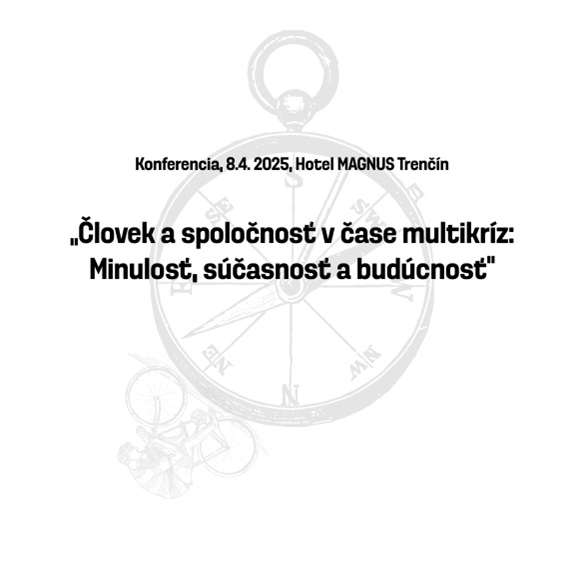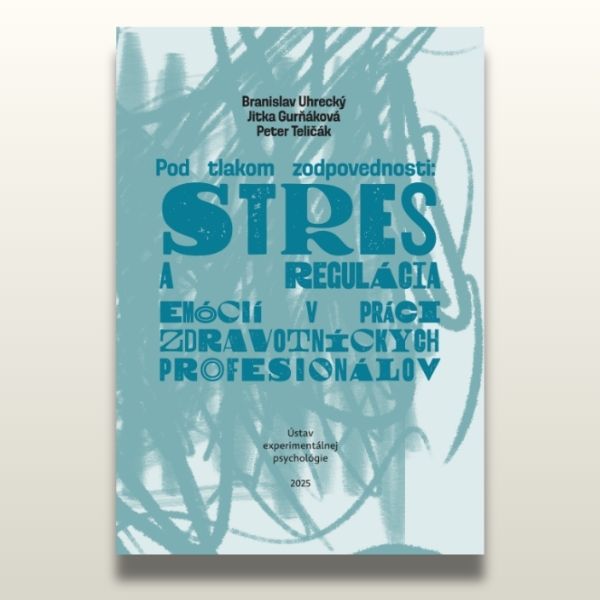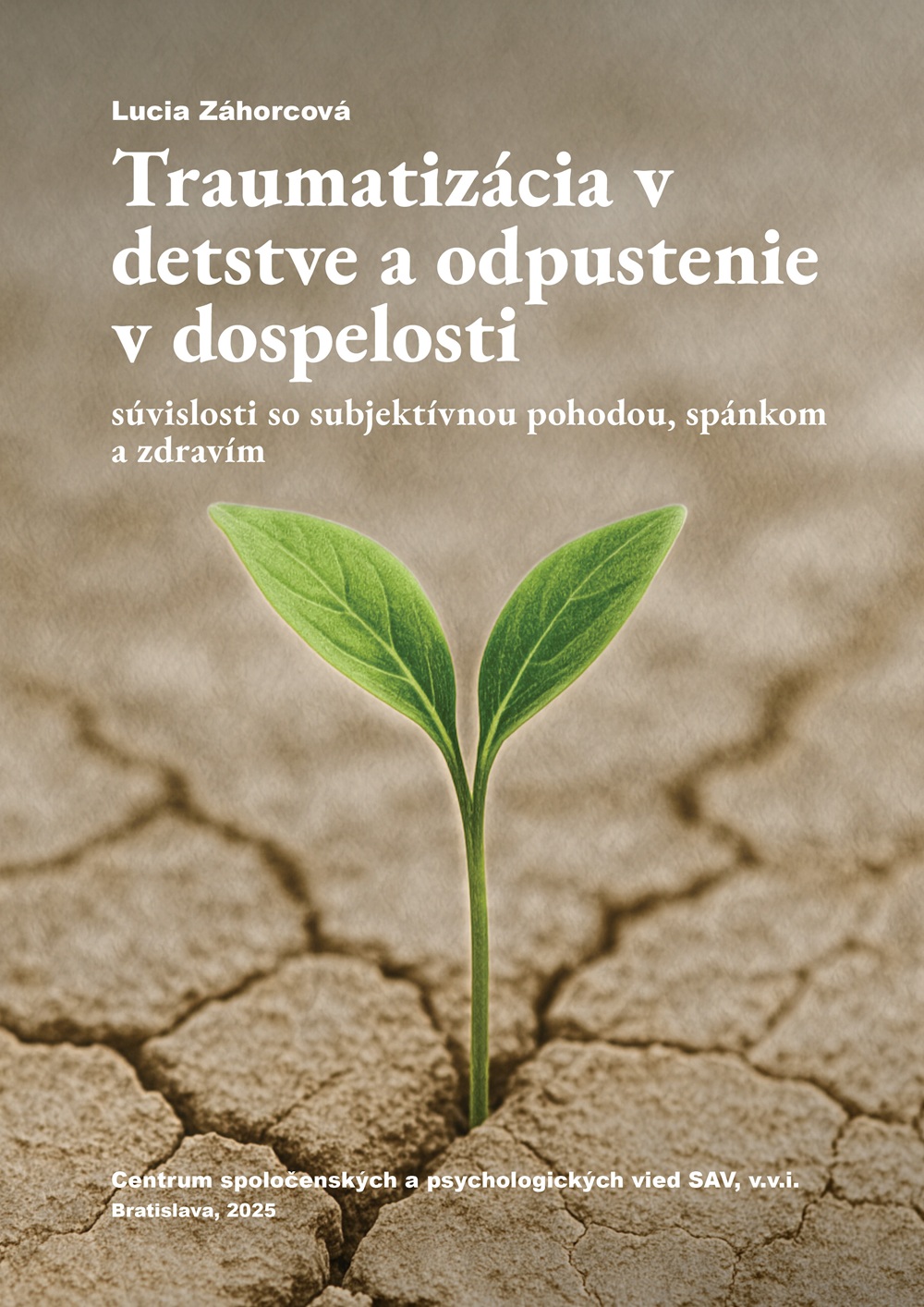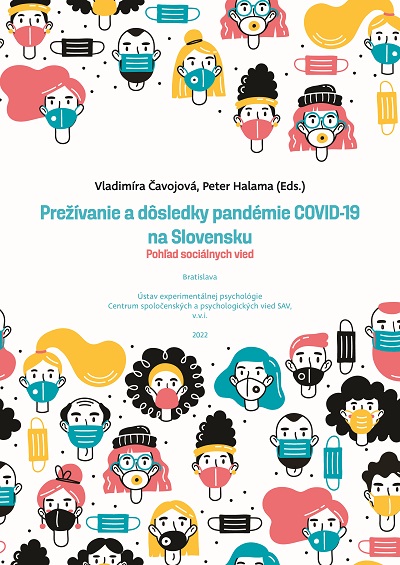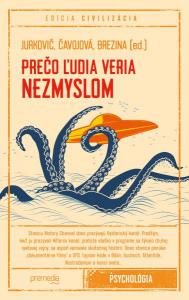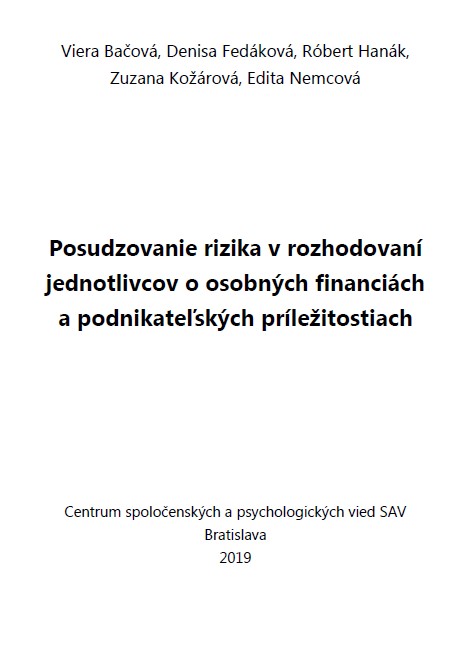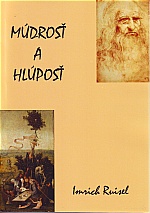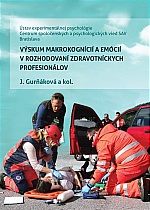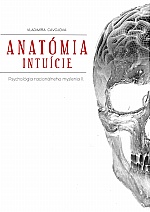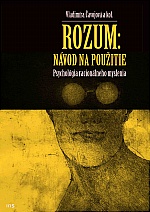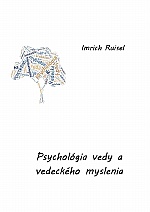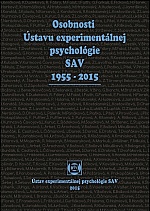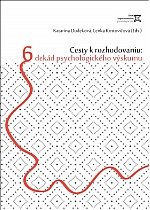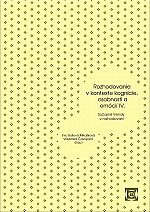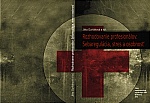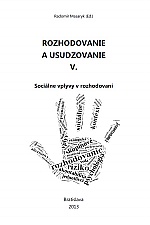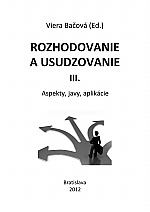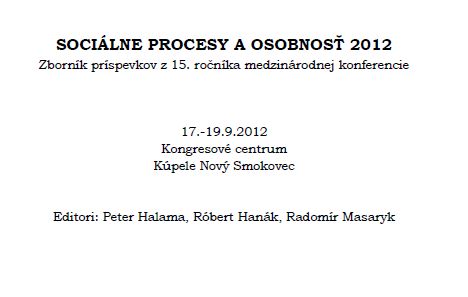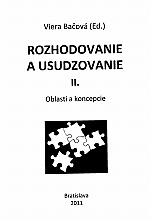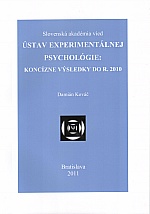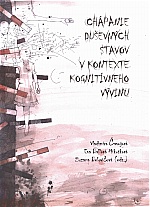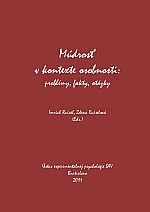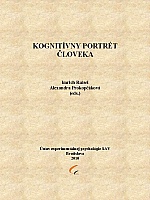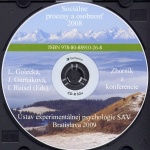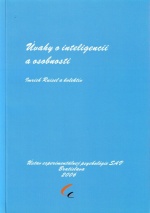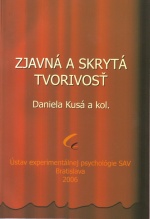- 2025 (5)
- 2022 (2)
- 2021 (2)
- 2020 (1)
- 2019 (2)
- 2018 (1)
- 2017 (3)
- 2016 (4)
- 2015 (3)
- 2014 (2)
- 2013 (5)
- 2012 (2)
- 2011 (6)
- 2010 (3)
- 2009 (6)
- 2008 (2)
- 2007 (4)
- 2006 (5)
- 2005 (1)
- 2004 (2)
Searching for Meaning in Chaos? Unfounded beliefs during the Covid-19 pandemic
Peter Teličák
Year: 2025
Publisher: Ústav experimentálnej psychológie, Centrum spoločenských a psychologických vied SAV
Number of pages: 105 s.
ISBN: 978-80-8298-013-7
Abstract:
The monograph Searching for Meaning in Chaos? focuses on selected psychological factors that could explain why people have succumbed to unfounded beliefs during the COVID-19 pandemic. The author analyses conspiracy and pseudoscientific beliefs as reactions to uncertainty, fear and loss of control, drawing on evolutionary, cognitive, emotional and personal variables. Particular attention is paid to the role of existential questions and the search for meaning in a chaotic environment. The research section of the monograph shows that a perceived sense of meaning in life can buffer the relationship between anxiety and susceptibility to such beliefs. The monograph also suggests ways to reduce these beliefs through the development of argumentative and critical thinking skills.
Publisher: Ústav experimentálnej psychológie, Centrum spoločenských a psychologických vied SAV
Number of pages: 105 s.
ISBN: 978-80-8298-013-7
Abstract:
The monograph Searching for Meaning in Chaos? focuses on selected psychological factors that could explain why people have succumbed to unfounded beliefs during the COVID-19 pandemic. The author analyses conspiracy and pseudoscientific beliefs as reactions to uncertainty, fear and loss of control, drawing on evolutionary, cognitive, emotional and personal variables. Particular attention is paid to the role of existential questions and the search for meaning in a chaotic environment. The research section of the monograph shows that a perceived sense of meaning in life can buffer the relationship between anxiety and susceptibility to such beliefs. The monograph also suggests ways to reduce these beliefs through the development of argumentative and critical thinking skills.
Individual and Society in Times of Multiple Crises: Past, Present, and Future: Book of Abstracts
Vladimíra Čavojová
Year: 2025
Publisher: Centrum spoločenských a psychologických vied SAV
Number of pages: 42 s.
ISBN: 978–80–8298–015–1
Abstract:
We present the book of abstracts from the conference titled "Individual and Society in Times of Multiple Crises: Past, Present, and Future", which was held on April 8, 2025, at the Magnus Hotel in Trenčín.
Publisher: Centrum spoločenských a psychologických vied SAV
Number of pages: 42 s.
ISBN: 978–80–8298–015–1
Abstract:
We present the book of abstracts from the conference titled "Individual and Society in Times of Multiple Crises: Past, Present, and Future", which was held on April 8, 2025, at the Magnus Hotel in Trenčín.
Under the Pressure of Responsibility: Stress and Emotion Regulation in the Work of Healthcare Professionals
Branislav Uhrecký, Jitka Gurňáková, Peter Teličák
Year: 2025
Publisher: Centrum spoločenských a psychologických vied SAV
Number of pages: 125 s.
ISBN: 978-80-8298-025-0
Abstract:
We usually do not stop to consider whether the surgeon performing our operation or the paramedic providing first aid might be under excessive psychological pressure. Yet they are human too, and their working conditions ultimately affect the health and lives of all of us. This monograph aims to provide deeper insight into the main factors contributing to excessive psychological strain among healthcare workers and how they cope with these pressures. The first two theoretical chapters provide an overview of what global research reveals about sources of stress and emotion regulation in various healthcare professions, while the remaining four chapters present the authors’ own empirical research. We examine levels of burnout and depression among healthcare professionals in the post-pandemic period, the effectiveness of different emotion regulation strategies, and the characteristics of healthcare workers who demonstrate higher psychological resilience. Finally, we introduce our own methodology for capturing psychological distancing—a key mechanism in emotion regulation.
Publisher: Centrum spoločenských a psychologických vied SAV
Number of pages: 125 s.
ISBN: 978-80-8298-025-0
Abstract:
We usually do not stop to consider whether the surgeon performing our operation or the paramedic providing first aid might be under excessive psychological pressure. Yet they are human too, and their working conditions ultimately affect the health and lives of all of us. This monograph aims to provide deeper insight into the main factors contributing to excessive psychological strain among healthcare workers and how they cope with these pressures. The first two theoretical chapters provide an overview of what global research reveals about sources of stress and emotion regulation in various healthcare professions, while the remaining four chapters present the authors’ own empirical research. We examine levels of burnout and depression among healthcare professionals in the post-pandemic period, the effectiveness of different emotion regulation strategies, and the characteristics of healthcare workers who demonstrate higher psychological resilience. Finally, we introduce our own methodology for capturing psychological distancing—a key mechanism in emotion regulation.
Childhood Trauma and Forgiveness in Adulthood
Lucia Záhorcová
Year: 2025
Publisher: Centrum spoločenských a psychologických vied Slovenskej akadémie vied, v. v. i.
Number of pages: 118 s.
ISBN: 978-80-8298-021-2
Abstract:
The monograph Childhood Trauma and Forgiveness in Adulthood explores the psychological connections between adverse childhood experiences (ACEs) and the capacity to forgive in adulthood. The author investigates how early trauma relates to later indicators of mental and physical health – well-being, sleep, and perceived physical health – and examines the role forgiveness plays in these relationships. Particular attention is given to neurobiological approaches to forgiveness and trauma, offering a new perspective on their interconnection. The findings suggest that among the different forms of forgiveness, early trauma is most strongly associated with lower levels of forgiveness toward the parent who was the source of traumatization. The results also indicate that the ability to forgive can mitigate the negative consequences of traumatic experiences on well-being and perceived physical health. The monograph points to safe avenues for incorporating forgiveness into trauma therapy practice and offers directions for further research in this field.
Publisher: Centrum spoločenských a psychologických vied Slovenskej akadémie vied, v. v. i.
Number of pages: 118 s.
ISBN: 978-80-8298-021-2
Abstract:
The monograph Childhood Trauma and Forgiveness in Adulthood explores the psychological connections between adverse childhood experiences (ACEs) and the capacity to forgive in adulthood. The author investigates how early trauma relates to later indicators of mental and physical health – well-being, sleep, and perceived physical health – and examines the role forgiveness plays in these relationships. Particular attention is given to neurobiological approaches to forgiveness and trauma, offering a new perspective on their interconnection. The findings suggest that among the different forms of forgiveness, early trauma is most strongly associated with lower levels of forgiveness toward the parent who was the source of traumatization. The results also indicate that the ability to forgive can mitigate the negative consequences of traumatic experiences on well-being and perceived physical health. The monograph points to safe avenues for incorporating forgiveness into trauma therapy practice and offers directions for further research in this field.
Experiments in Psychology: How knowledge is created
Vladimíra Čavojová, Eva Ballová Mikušková & Michal Čerešník
Year: 2025
Publisher: Iris
Number of pages: 222 s.
ISBN: 978-80-8200-150-4
Abstract:
If you have ever read a textbook, you know that textbooks are full of information, lessons, laws, and classifications. Textbooks offer us a comprehensive view of a field and summarize the state of knowledge at a given point in time. But have you ever thought about how the knowledge that has made it into textbooks and is now conveyed to students as immutable facts was created? In this book, we have focused on this very process - we want to gradually bring together several well-known and less well-known experiments in psychology and describe in detail how the knowledge that eventually made it into textbooks as fact was created. Understanding research methodology, and therefore the reliability of research results, is part of scientific literacy, which is becoming increasingly necessary today. It forces us to pay attention not only to the often fantastic information, but especially to the question of how this information was obtained, and therefore how reliable it is. Scientific literacy can thus help with critical thinking in general – it is not only about assessing the reliability of research findings, but also about assessing the reliability of information that we learn on Facebook, in the daily press, in the news or from acquaintances. The textbook is the second – expanded edition of the original Experiments in Psychology from 2017 and is dedicated to all those who are curious about how psychological knowledge arises.
Publisher: Iris
Number of pages: 222 s.
ISBN: 978-80-8200-150-4
Abstract:
If you have ever read a textbook, you know that textbooks are full of information, lessons, laws, and classifications. Textbooks offer us a comprehensive view of a field and summarize the state of knowledge at a given point in time. But have you ever thought about how the knowledge that has made it into textbooks and is now conveyed to students as immutable facts was created? In this book, we have focused on this very process - we want to gradually bring together several well-known and less well-known experiments in psychology and describe in detail how the knowledge that eventually made it into textbooks as fact was created. Understanding research methodology, and therefore the reliability of research results, is part of scientific literacy, which is becoming increasingly necessary today. It forces us to pay attention not only to the often fantastic information, but especially to the question of how this information was obtained, and therefore how reliable it is. Scientific literacy can thus help with critical thinking in general – it is not only about assessing the reliability of research findings, but also about assessing the reliability of information that we learn on Facebook, in the daily press, in the news or from acquaintances. The textbook is the second – expanded edition of the original Experiments in Psychology from 2017 and is dedicated to all those who are curious about how psychological knowledge arises.
The role of communication with the patient and relatives in EMS emergencies
Jitka Gurňáková & Denisa Marcinechová
Year: 2022
Publisher: Ústav experimentálnej psychológie, Centrum spoločenských a psychologických vied SAV
Number of pages: 179 s. s.
ISBN: 978-80-89524-65-5
Abstract:
The monograph summarizes the current state of knowledge about communication with the patient in healthcare. Based on three qualitative research studies, it analyses the specific importance of various aspects of behaviour and communication of paramedics and physicians with the patient, relatives, or accidental witnesses. The ability to communicate with the patient is one of the key non-technical (cognitive and social) skills for providing healthcare. It describes the specifics of EMS crews’ work and points out certain options for increasing the quality and safety. The first study defined the meaning, goals, and basic principles of communication with the patient from the paramedics and physicians’ perspective. The second study provided insight into the importance of EMS crew communication with the patient and their relatives from the other side – through the analysis of real initiatives to investigate the quality of emergency pre-hospital care, which were addressed to the Health Care Surveillance Authority. The third study provided a more comprehensive description of those aspects of communication and overall behaviour of EMS crews, on which the satisfaction of patients, relatives, or accidental witnesses was dependent.
Publisher: Ústav experimentálnej psychológie, Centrum spoločenských a psychologických vied SAV
Number of pages: 179 s. s.
ISBN: 978-80-89524-65-5
Abstract:
The monograph summarizes the current state of knowledge about communication with the patient in healthcare. Based on three qualitative research studies, it analyses the specific importance of various aspects of behaviour and communication of paramedics and physicians with the patient, relatives, or accidental witnesses. The ability to communicate with the patient is one of the key non-technical (cognitive and social) skills for providing healthcare. It describes the specifics of EMS crews’ work and points out certain options for increasing the quality and safety. The first study defined the meaning, goals, and basic principles of communication with the patient from the paramedics and physicians’ perspective. The second study provided insight into the importance of EMS crew communication with the patient and their relatives from the other side – through the analysis of real initiatives to investigate the quality of emergency pre-hospital care, which were addressed to the Health Care Surveillance Authority. The third study provided a more comprehensive description of those aspects of communication and overall behaviour of EMS crews, on which the satisfaction of patients, relatives, or accidental witnesses was dependent.
Experiencing and consequences of the COVID-19 pandemic in Slovakia: A social science perspective
Vladimíra Čavojová & Peter Halama (Eds.)
Year: 2022
Publisher: Ústav experimentálnej psychológie, Centrum spoločenských a psychologických vied SAV
Number of pages: 82 s.
ISBN: 978-80-89524-70-9
Abstract:
The social consequences of the COVID-19 pandemic show that the pandemic is not an isolated medical problem that can be solved only by a new vaccine or drug for the disease COVID-19, but that it affects and affects all areas of society and requires a comprehensive approach to solving the resulting consequences. It is here that the social sciences have an irreplaceable role, which by their focus can reflect social problems caused by the COVID-19 pandemic and bring ideas for solutions in the field of public policy, economics, public health, etc. This collection was created as a result of research into the impacts of the COVID-19 pandemic by social scientists from various fields, and an effort to present the results of the research to a wider professional public. Employees of social science institutes of SAS were approached, and they prepared a total of 10 contributions. All of them somehow try to reflect the impact of the pandemic in various areas of social functioning.
Publisher: Ústav experimentálnej psychológie, Centrum spoločenských a psychologických vied SAV
Number of pages: 82 s.
ISBN: 978-80-89524-70-9
Abstract:
The social consequences of the COVID-19 pandemic show that the pandemic is not an isolated medical problem that can be solved only by a new vaccine or drug for the disease COVID-19, but that it affects and affects all areas of society and requires a comprehensive approach to solving the resulting consequences. It is here that the social sciences have an irreplaceable role, which by their focus can reflect social problems caused by the COVID-19 pandemic and bring ideas for solutions in the field of public policy, economics, public health, etc. This collection was created as a result of research into the impacts of the COVID-19 pandemic by social scientists from various fields, and an effort to present the results of the research to a wider professional public. Employees of social science institutes of SAS were approached, and they prepared a total of 10 contributions. All of them somehow try to reflect the impact of the pandemic in various areas of social functioning.
Why people need crises. Psychology of social changes.
Ivan Brezina & Vladimíra Čavojová (Eds.)
Year: 2021
Publisher: Premedia
Number of pages: 200 s.
ISBN: 9788082420237
Abstract:
We usually perceive crises as a dangerous, expensive, and exhausting situation that diverts human energy and attention from the current agenda and priorities. At the same time, human history can be seen as a living chain of genre-diverse, often tragic social crises interwoven only with rare periods of prosperity and peace. The aim of this book is to take a closer look at how people cope with crises, to find recurring mechanisms and patterns of behavior, and to place this knowledge in the broader context of the crises we have as a species - as well as those that may still be they are waiting. The individual chapters also address the following topics: Crisis as an opportunity for change Why during crises endorsement of unfounded beliefs increases How lockdown affected our social relations Mental health crisis Personal finances in crisis Global warming: hoaxes, fiction, and facts Psychology of climate inactivity
Publisher: Premedia
Number of pages: 200 s.
ISBN: 9788082420237
Abstract:
We usually perceive crises as a dangerous, expensive, and exhausting situation that diverts human energy and attention from the current agenda and priorities. At the same time, human history can be seen as a living chain of genre-diverse, often tragic social crises interwoven only with rare periods of prosperity and peace. The aim of this book is to take a closer look at how people cope with crises, to find recurring mechanisms and patterns of behavior, and to place this knowledge in the broader context of the crises we have as a species - as well as those that may still be they are waiting. The individual chapters also address the following topics: Crisis as an opportunity for change Why during crises endorsement of unfounded beliefs increases How lockdown affected our social relations Mental health crisis Personal finances in crisis Global warming: hoaxes, fiction, and facts Psychology of climate inactivity
Psychological context of retirement adjustment
Viera Bačová, Peter Halama (Eds.)
Year: 2021
Publisher: Ústav experimentálnej psychológie, Centrum spoločenských a psychologických vied SAV
Number of pages: 131 s.
ISBN: 978-80-89524-54-9
Abstract:
Human life expectancy has been increasing for a long time, and there is no indication that this trend of increasing should end. The number of retirees is growing and will continue to grow. At the same time, they will spend a long time of their lives in retirement. The psychological research of the authors responds to these facts - and challenges. In the six chapters of the monograph, the authors present theories and models of retirement, especially those related to adjustment to this life phase. Retirement theories are followed by retirement planning topics and the evaluation of the retirement transition. Traditionally, retirement is associated with aging, so the monograph does not lack a view of experiencing satisfaction and well-being as an indicator of successful adjustment to retirement and aging. The following two chapters inform how personality traits and forgiveness contribute to retirement management. In Slovakia, the monograph represents the first psychological insights into the field, which is - and will increasingly be - very important socially and individually.
Publisher: Ústav experimentálnej psychológie, Centrum spoločenských a psychologických vied SAV
Number of pages: 131 s.
ISBN: 978-80-89524-54-9
Abstract:
Human life expectancy has been increasing for a long time, and there is no indication that this trend of increasing should end. The number of retirees is growing and will continue to grow. At the same time, they will spend a long time of their lives in retirement. The psychological research of the authors responds to these facts - and challenges. In the six chapters of the monograph, the authors present theories and models of retirement, especially those related to adjustment to this life phase. Retirement theories are followed by retirement planning topics and the evaluation of the retirement transition. Traditionally, retirement is associated with aging, so the monograph does not lack a view of experiencing satisfaction and well-being as an indicator of successful adjustment to retirement and aging. The following two chapters inform how personality traits and forgiveness contribute to retirement management. In Slovakia, the monograph represents the first psychological insights into the field, which is - and will increasingly be - very important socially and individually.
The Trust Crisis: Theory and Research
Matáš Grežo (Ed.)
Year: 2020
Publisher: Iris
Number of pages: 206 s.
ISBN: 978-80-8200-069-9
Abstract:
In recent years, there has been an increased number of voices in the public discourse of Slovak society drawing attention to the trust crisis. The Slovak judiciary, police or army have one of the lowest levels of trust among the EU countries. The trust in the national council, the government or political parties is not positive either, achieving below-average values within the EU countries. In addition to low institutional trust, changes in interpersonal trust can also be observed. Many authors describe the current age as post-factual. The credibility of professional authorities in areas such as health, finance, politics, diplomacy, and religion is often questioned by misinformation and conspiracy theories. On the other hand, we often put our trust in people offering unduly simple solutions for too complex problems. When searching for an answer to the question of how to increase trust in our society, plenty of other questions arise, which need to be answered first. How can we form interpersonal and institutional trust? Why are some of us more trusting than others? What is the difference between other person’s trustworthiness, the intention to trust them, and trusting behaviour? Why do we tend to trust people who are similar to us and distrust strangers? What happens to society if their members do not trust their leaders and institutions for too long? The team of authors seeks answers to these and many other questions in the seven chapters of the book entitled "The Trust Crisis: Theory and Research".
Publisher: Iris
Number of pages: 206 s.
ISBN: 978-80-8200-069-9
Abstract:
In recent years, there has been an increased number of voices in the public discourse of Slovak society drawing attention to the trust crisis. The Slovak judiciary, police or army have one of the lowest levels of trust among the EU countries. The trust in the national council, the government or political parties is not positive either, achieving below-average values within the EU countries. In addition to low institutional trust, changes in interpersonal trust can also be observed. Many authors describe the current age as post-factual. The credibility of professional authorities in areas such as health, finance, politics, diplomacy, and religion is often questioned by misinformation and conspiracy theories. On the other hand, we often put our trust in people offering unduly simple solutions for too complex problems. When searching for an answer to the question of how to increase trust in our society, plenty of other questions arise, which need to be answered first. How can we form interpersonal and institutional trust? Why are some of us more trusting than others? What is the difference between other person’s trustworthiness, the intention to trust them, and trusting behaviour? Why do we tend to trust people who are similar to us and distrust strangers? What happens to society if their members do not trust their leaders and institutions for too long? The team of authors seeks answers to these and many other questions in the seven chapters of the book entitled "The Trust Crisis: Theory and Research".
Marek Jurkovič, Vladimíra Čavojová, Ivan Brezina
Year: 2019
Publisher: Premedia
Number of pages: 312 s.
ISBN: 9788081597572
Abstract:
The belief in bullshit overlaps the whole history of humanity. But only today it has so many new forms and names. Misinformation, propaganda, fake news, conspiracy theories, hoaxes, trolls, post-factual times, pseudoscience, charlatans. These are just a few of the terms we are seeing more and more often and are trying to describe the phenomena many societies are struggling with today. The importance of these words is also evidenced by the fact that in recent years, several of them have appeared in polls or expert jury decisions for the word of the year. History on the path to knowledge is rich in human error. However, when we talk about the post-factual era, we are talking about the fact that there is a decline in the interest in the truth. Unfounded beliefs are spreading faster than they once were, and by the time someone puts the record straight, the damage has long been done. In addition, even long-refuted untruths keep coming back to us from the netherworld, such as the belief that the Earth is flat. The trend of ignoring the truth has many manifestations, the team of Slovak psychologists in this publication gives dozens of examples and seeks ways to awaken people's critical thinking.
Publisher: Premedia
Number of pages: 312 s.
ISBN: 9788081597572
Abstract:
The belief in bullshit overlaps the whole history of humanity. But only today it has so many new forms and names. Misinformation, propaganda, fake news, conspiracy theories, hoaxes, trolls, post-factual times, pseudoscience, charlatans. These are just a few of the terms we are seeing more and more often and are trying to describe the phenomena many societies are struggling with today. The importance of these words is also evidenced by the fact that in recent years, several of them have appeared in polls or expert jury decisions for the word of the year. History on the path to knowledge is rich in human error. However, when we talk about the post-factual era, we are talking about the fact that there is a decline in the interest in the truth. Unfounded beliefs are spreading faster than they once were, and by the time someone puts the record straight, the damage has long been done. In addition, even long-refuted untruths keep coming back to us from the netherworld, such as the belief that the Earth is flat. The trend of ignoring the truth has many manifestations, the team of Slovak psychologists in this publication gives dozens of examples and seeks ways to awaken people's critical thinking.
Risk assessment in individuals' decisions on personal finance and business opportunities
Viera Bačová, Denisa Fedáková, Róbert Hanák, Zuzana Kožárová, Edita Nemcová
Year: 2019
Publisher: Centrum spoločenských a psychologických vied SAV
Number of pages: 114 s.
ISBN: 978-80-89524-43-3
Abstract:
The monograph Risk assessment in individuals' decisions on personal finance and business opportunities consists of several successive chapters. In the first chapter The Importance of Small and Medium Enterprises and Limits of Their Development, Edita Nemcová introduces the reader to the issue of the importance of small and medium enterprises. From a broader perspective, she explains how suboptimal decisions can lead to business failure and the importance of supporting them. In the following chapter, Zuzana Kožárová introduces entrepreneurship education as one of many tools that can be used to improve business decision-making. The decision to start a business is influenced by many personal, cognitive and socio-demographic factors. This issue is addressed in the next chapter The intention to do business in the context of selected characteristics and family environment of employed, unemployed and entrepreneurs by Denisa Fedáková. In terms of consequences and cognitive effort, a certain equivalent of the decision to make a self-retirement decision that young people are currently forced to take. This issue is addressed by Viera Bačová in the chapter Financial Pension Planning for Young People. At the end of the monograph, Róbert Hanák summarizes the findings and results produced by co-authors but published elsewhere.
Publisher: Centrum spoločenských a psychologických vied SAV
Number of pages: 114 s.
ISBN: 978-80-89524-43-3
Abstract:
The monograph Risk assessment in individuals' decisions on personal finance and business opportunities consists of several successive chapters. In the first chapter The Importance of Small and Medium Enterprises and Limits of Their Development, Edita Nemcová introduces the reader to the issue of the importance of small and medium enterprises. From a broader perspective, she explains how suboptimal decisions can lead to business failure and the importance of supporting them. In the following chapter, Zuzana Kožárová introduces entrepreneurship education as one of many tools that can be used to improve business decision-making. The decision to start a business is influenced by many personal, cognitive and socio-demographic factors. This issue is addressed in the next chapter The intention to do business in the context of selected characteristics and family environment of employed, unemployed and entrepreneurs by Denisa Fedáková. In terms of consequences and cognitive effort, a certain equivalent of the decision to make a self-retirement decision that young people are currently forced to take. This issue is addressed by Viera Bačová in the chapter Financial Pension Planning for Young People. At the end of the monograph, Róbert Hanák summarizes the findings and results produced by co-authors but published elsewhere.
Wisdom and folly
Imrich Ruisel
Year: 2018
Publisher: Ústav experimentálnej psychológie, Centrum spoločenských a psychologických vied SAV
Number of pages: 397 s.
ISBN: 978-80-88910-61-9
Publisher: Ústav experimentálnej psychológie, Centrum spoločenských a psychologických vied SAV
Number of pages: 397 s.
ISBN: 978-80-88910-61-9
Decision-making of professionals. Processual, personality and social aspects
Peter Halama (Ed.)
Year: 2017
Publisher: Ústav experimentálnej psychológie CSPV SAV
Number of pages: 149 s.
ISBN: 978-80-88910-56-5
Abstract:
The book presents results of the project supported by the Slovak Research and Development Agency that was running at the Institute of Experimental Psychology in 2013 – 2017. The topic was study of decision-making processes in the context of selected professions with emphasis on their personality, social and processual aspects. The book comprises 7 chapters that cover the individual topics of the research project. These include decision-making of financial professionals, managers, healthcare workers or teachers. The chapters analyze decision-making processes in the context of selected personality, cognitive and social variables.
Publisher: Ústav experimentálnej psychológie CSPV SAV
Number of pages: 149 s.
ISBN: 978-80-88910-56-5
Abstract:
The book presents results of the project supported by the Slovak Research and Development Agency that was running at the Institute of Experimental Psychology in 2013 – 2017. The topic was study of decision-making processes in the context of selected professions with emphasis on their personality, social and processual aspects. The book comprises 7 chapters that cover the individual topics of the research project. These include decision-making of financial professionals, managers, healthcare workers or teachers. The chapters analyze decision-making processes in the context of selected personality, cognitive and social variables.
The research of macrocognition and emotion in decision-making of health care professionals
Jitka Gurňáková a kol.
Year: 2017
Publisher: Ústav experimentálnej psychológie CSPV SAV
Number of pages: 294 s.
ISBN: 978-80-88910-60-2
Abstract:
Successful decision-making of professionals in unknown, complex, and dynamically changing conditions depends not only on deep technical knowledge, but also on specific cognitive and social skills based on practical experience. The ability to filter important information from the less important, find the problem and choose an efficient solution, coordinate several activities for the benefit of achieving the goal, or the ability to make plans and adapt the plans to the current situation are examples of complex cognitive processes, known as macrocognitions. Solving uniquely difficult situations in the line of work of health care professionals leads to the increase of importance of their ability to regulate their own emotions. This book presents, in six empirical studies, the analysis results of selected psychological factors that influence the effectiveness of decision-making in the work of paramedics, emergency services physicians, and nurses. Despite the scientific character of this book, the findings presented within can be of significance not only to researchers, but also to all those who care about the quality of health care, education and professional growth of health care professionals.
Publisher: Ústav experimentálnej psychológie CSPV SAV
Number of pages: 294 s.
ISBN: 978-80-88910-60-2
Abstract:
Successful decision-making of professionals in unknown, complex, and dynamically changing conditions depends not only on deep technical knowledge, but also on specific cognitive and social skills based on practical experience. The ability to filter important information from the less important, find the problem and choose an efficient solution, coordinate several activities for the benefit of achieving the goal, or the ability to make plans and adapt the plans to the current situation are examples of complex cognitive processes, known as macrocognitions. Solving uniquely difficult situations in the line of work of health care professionals leads to the increase of importance of their ability to regulate their own emotions. This book presents, in six empirical studies, the analysis results of selected psychological factors that influence the effectiveness of decision-making in the work of paramedics, emergency services physicians, and nurses. Despite the scientific character of this book, the findings presented within can be of significance not only to researchers, but also to all those who care about the quality of health care, education and professional growth of health care professionals.
Cognitive psychology in the Middle Ages
Imrich Ruisel
Year: 2017
Publisher: Ústav experimentálnej psychológie, Centrum spoločenských a psychologických vied SAV
Number of pages: 190 s.
ISBN: 978-80-88910-59-6
Publisher: Ústav experimentálnej psychológie, Centrum spoločenských a psychologických vied SAV
Number of pages: 190 s.
ISBN: 978-80-88910-59-6
Judgment and Decision Making VI: Individual and others: Decision making in social context
Radomír Masaryk, Jana Bašnáková (Eds.)
Year: 2016
Publisher: Olomouc
Number of pages: 240 s.
ISBN: 978-80-244-5033-9
Abstract:
The monograph summarizes the results of the VEGA grant project „Social influences in individual decision making“. Our inspiration to focus on social influences was the fact that traditional approaches to decision making usually study only limited aspects of the decision making process, often outside of their natural context. Only a few traditional researches consider also wider social or cultural factors that constitute the individual’s decision making environment and naturally affect the decisions. At the same time, changeable cultural and social context is one of the reasons why it is so difficult to find and isolate „universal“ rules for human decision making.
Publisher: Olomouc
Number of pages: 240 s.
ISBN: 978-80-244-5033-9
Abstract:
The monograph summarizes the results of the VEGA grant project „Social influences in individual decision making“. Our inspiration to focus on social influences was the fact that traditional approaches to decision making usually study only limited aspects of the decision making process, often outside of their natural context. Only a few traditional researches consider also wider social or cultural factors that constitute the individual’s decision making environment and naturally affect the decisions. At the same time, changeable cultural and social context is one of the reasons why it is so difficult to find and isolate „universal“ rules for human decision making.
Anatomy of intuition. Psychology of rational thinking II.
Vladimíra Čavojová
Year: 2016
Publisher: Iris
Number of pages: 132 s.
ISBN: 9788089726738
Abstract:
The question of how to make decisions – whether rationally “with our head“ or intuitively “with our heart“ is one of the most frequent questions psychologists have to face. To what extent can we rely on intuition in our judgment and decision making – we asked this question at the beginning of our research project and this book is the result of our thinking and research related to the role of intuition in decision making and judgment. Nevertheless, not even this book offers a definite answer, rather a view to what extent it pays off to rely on intuition and in what circumstances, because a realistic (and maybe a little bit skeptical) approach to our own intuition can help us make better and informed decisions that we won’t regret later.
Publisher: Iris
Number of pages: 132 s.
ISBN: 9788089726738
Abstract:
The question of how to make decisions – whether rationally “with our head“ or intuitively “with our heart“ is one of the most frequent questions psychologists have to face. To what extent can we rely on intuition in our judgment and decision making – we asked this question at the beginning of our research project and this book is the result of our thinking and research related to the role of intuition in decision making and judgment. Nevertheless, not even this book offers a definite answer, rather a view to what extent it pays off to rely on intuition and in what circumstances, because a realistic (and maybe a little bit skeptical) approach to our own intuition can help us make better and informed decisions that we won’t regret later.
Brain: User’s manual. Psychology of rational thinking.
Vladimíra Čavojová, Eva Ballová Mikušková, Martin Majerník, Marek Jurkovič, Andrea Juhásová, & Radomír Masaryk
Year: 2016
Publisher: Iris
Number of pages: 172 s.
ISBN: 9788089726578
Abstract:
There are enough specialized books in Slovakia that focus on thinking. However, there are only a few that would apply methods of scientific thinking into everyday life in a comprehensive and evidence based way. The group of authors offers this “manual of common sense” not only to students and their teachers, but to all those taking interest in psychology. The book is a set of essays that present scientists’ and teachers’ opinions. They show the importance of culturing rationality in everyday life and education from different aspects. The authors convince us that science does not strip things from their secrets and “miracles”, which science is commonly accused of. Openness to critical thinking leads to uncovering more and more fascinating mysteries than those found in simplified and unambiguous statements of pseudoscientific theories. Reality is more complicated than we often think or care to admit. This book is a “set book” for all who wish to embark on an adventurous journey of knowledge, full of risk and uncertainty.
Publisher: Iris
Number of pages: 172 s.
ISBN: 9788089726578
Abstract:
There are enough specialized books in Slovakia that focus on thinking. However, there are only a few that would apply methods of scientific thinking into everyday life in a comprehensive and evidence based way. The group of authors offers this “manual of common sense” not only to students and their teachers, but to all those taking interest in psychology. The book is a set of essays that present scientists’ and teachers’ opinions. They show the importance of culturing rationality in everyday life and education from different aspects. The authors convince us that science does not strip things from their secrets and “miracles”, which science is commonly accused of. Openness to critical thinking leads to uncovering more and more fascinating mysteries than those found in simplified and unambiguous statements of pseudoscientific theories. Reality is more complicated than we often think or care to admit. This book is a “set book” for all who wish to embark on an adventurous journey of knowledge, full of risk and uncertainty.
Psychology of science and scientific thinking
Imrich Ruisel
Year: 2016
Publisher: Ústav experimentálnej psychológie, Centrum spoločenských a psychologických vied SAV
Number of pages: 423 s.
ISBN: 978-80-88910-54-1
Publisher: Ústav experimentálnej psychológie, Centrum spoločenských a psychologických vied SAV
Number of pages: 423 s.
ISBN: 978-80-88910-54-1
Notable figures of the Institute of Experimental Psychology SAS
Eva Ballová Mikušková, Vladimíra Čavojová (Eds.)
Year: 2015
Publisher: Ústav experimentálnej psychológie SAV
Number of pages: 114 s.
ISBN: 978-80-88910-51-0
Abstract:
IEP SAS is not only a building or workplace - it was and still is formed by people - many individuals, who contributed to its present form and built its good name and brand. Dedicated especially to them, the book Notable figures of the Institute of Experimental Psychology SAS. 1955-2015, was published by IEP SAS in the event of its 60th anniversary of foundation. If you would like to obtain this original book, please complete the following form: http://goo.gl/forms/rKyLgp1vY3
Publisher: Ústav experimentálnej psychológie SAV
Number of pages: 114 s.
ISBN: 978-80-88910-51-0
Abstract:
IEP SAS is not only a building or workplace - it was and still is formed by people - many individuals, who contributed to its present form and built its good name and brand. Dedicated especially to them, the book Notable figures of the Institute of Experimental Psychology SAS. 1955-2015, was published by IEP SAS in the event of its 60th anniversary of foundation. If you would like to obtain this original book, please complete the following form: http://goo.gl/forms/rKyLgp1vY3
Roads to decision making: Six decades of psychological research
Katarína Dudeková, Lenka Kostovičová (Eds.)
Year: 2015
Publisher: Ústav experimentálnej psychológie SAV
Number of pages: 151 s.
ISBN: 978-80-88910-52-7
Abstract:
Reviewed proceedings from the conference organized for the 60th anniversary of the Institute of Experimental Psychology SASc. on April 10, 2015 in Bratislava. The proceedings comprise full texts of the conference papers. There is a double meaning to the symbolic title Roads to decision making. It is a reflection of what is already in the past, but especially of what lies ahead of us, within the research trying to understand the processes of judgments and choices of people in their professional and everyday lives. However, roads present an analogy to various approaches, methods, and paradigms that can reveal the mysteries of human cognitions.
Publisher: Ústav experimentálnej psychológie SAV
Number of pages: 151 s.
ISBN: 978-80-88910-52-7
Abstract:
Reviewed proceedings from the conference organized for the 60th anniversary of the Institute of Experimental Psychology SASc. on April 10, 2015 in Bratislava. The proceedings comprise full texts of the conference papers. There is a double meaning to the symbolic title Roads to decision making. It is a reflection of what is already in the past, but especially of what lies ahead of us, within the research trying to understand the processes of judgments and choices of people in their professional and everyday lives. However, roads present an analogy to various approaches, methods, and paradigms that can reveal the mysteries of human cognitions.
Introduction to financial psychology
Michal Stríženec
Year: 2015
Publisher:
Number of pages: s.
ISBN:
Abstract:
Renowned research psychologist Michal Stríženec wrote this book in order to introduce a new area of research to Slovak psychologists – financial psychology. This area is widely elaborated abroad but is almost unknown in Slovakia. The publication can be a help for psychology students to get a grasp of this area, but also for those focusing on economic psychology. The book presents the birth and current state of financial psychology, it deals with financial literacy, financial decision-making, financial personality and emotions, and behavior of people in common financial situations (e.g., saving, use of money, credit, pension saving).
Publisher:
Number of pages: s.
ISBN:
Abstract:
Renowned research psychologist Michal Stríženec wrote this book in order to introduce a new area of research to Slovak psychologists – financial psychology. This area is widely elaborated abroad but is almost unknown in Slovakia. The publication can be a help for psychology students to get a grasp of this area, but also for those focusing on economic psychology. The book presents the birth and current state of financial psychology, it deals with financial literacy, financial decision-making, financial personality and emotions, and behavior of people in common financial situations (e.g., saving, use of money, credit, pension saving).
Cognitive mosaic of human personality
Ivan Sarmány-Schuller a kol.
Year: 2014
Publisher: Ústav experimentálnej psychológie SAV
Number of pages: 244 s.
ISBN: 978-80-88910-50-3
Abstract:
“Cognitive mosaic of human personality” was written for a wider circle of readers, not only psychologists, who are probably the closest to the questions of personality. Mosaic in this case means completing individual pieces into the image of such complex phenomenon as the human personality. We are trying to complete the knowledge in the studied field by theoretical elaboration of individual personality phenomena and by experimental activities. Thus, the book includes both, theory and research results. The central topic of the book is personality construct “need for structure”, which profiles individual parts of the collective monograph. Presented are basic principles of this construct, but also many research findings of Slovak as well as foreign origin (Ivan Sarmány-Schuller). Second chapter focuses on such important and currently almost privileged questions of decision-making and related phenomena of rational and intuitive decision-making and thinking, as well as on historical questions of knowledge, cognitive fallacies and biases (Imrich Ruisel). Chapter bearing the name “Mosaics of optimism” (Matúš Grežo and Ivan Sarmány-Schuller) is a theoretic elaboration of several concepts of optimism, from naive to real, from explanatory to dispositional style, from optimism of managers to the optimism of financial analysts. The fourth chapter focuses on another part of personality that is significantly related to decision-making and preferred way of information processing, in this case it is the relationship between cognitive styles and religiosity, including religious fundamentalism (Lucia Adamovová). The next three chapters describe in more detail the theory of schemas (Jana Kordačová), either schemas and their place in the cognitive structuring of knowledge (Chapter 5), newer approaches to the questions of structuring human cognition (Chapter 6), or types of schemas (physical, self, gender, cultural, etc.) that are presented in Chapter 7, called “Forms of cognitive structuring and schema attributes”. Chapter 8 deals with the problem of personality characteristic in relation to the personality concept “need for structure”, especially in relation to counterfactual thinking, wisdom and self-efficacy (Alexandra Prokopčáková). Rarely studied questions related to the neurocognitive approach to the study of the need for cognitive structure emerge in Chapter 9 (Mária Túnyiová). The following chapter (Chapter 10) is dedicated to seldom studied questions of the need for structure in the context of intercultural psychology, where such phenomena as, e.g., ambiguity tolerance, analytical vs. intuitive cognitive strategies are compared on a theoretical level (Ivan Brezina). Questions of coping also belong to the mosaic of personality, in this case reactive and proactive (coping) in the sensitive age of adolescence, these form the final chapter (Chapter 11), which presents research findings of gender differences (Emília Ficková).
Publisher: Ústav experimentálnej psychológie SAV
Number of pages: 244 s.
ISBN: 978-80-88910-50-3
Abstract:
“Cognitive mosaic of human personality” was written for a wider circle of readers, not only psychologists, who are probably the closest to the questions of personality. Mosaic in this case means completing individual pieces into the image of such complex phenomenon as the human personality. We are trying to complete the knowledge in the studied field by theoretical elaboration of individual personality phenomena and by experimental activities. Thus, the book includes both, theory and research results. The central topic of the book is personality construct “need for structure”, which profiles individual parts of the collective monograph. Presented are basic principles of this construct, but also many research findings of Slovak as well as foreign origin (Ivan Sarmány-Schuller). Second chapter focuses on such important and currently almost privileged questions of decision-making and related phenomena of rational and intuitive decision-making and thinking, as well as on historical questions of knowledge, cognitive fallacies and biases (Imrich Ruisel). Chapter bearing the name “Mosaics of optimism” (Matúš Grežo and Ivan Sarmány-Schuller) is a theoretic elaboration of several concepts of optimism, from naive to real, from explanatory to dispositional style, from optimism of managers to the optimism of financial analysts. The fourth chapter focuses on another part of personality that is significantly related to decision-making and preferred way of information processing, in this case it is the relationship between cognitive styles and religiosity, including religious fundamentalism (Lucia Adamovová). The next three chapters describe in more detail the theory of schemas (Jana Kordačová), either schemas and their place in the cognitive structuring of knowledge (Chapter 5), newer approaches to the questions of structuring human cognition (Chapter 6), or types of schemas (physical, self, gender, cultural, etc.) that are presented in Chapter 7, called “Forms of cognitive structuring and schema attributes”. Chapter 8 deals with the problem of personality characteristic in relation to the personality concept “need for structure”, especially in relation to counterfactual thinking, wisdom and self-efficacy (Alexandra Prokopčáková). Rarely studied questions related to the neurocognitive approach to the study of the need for cognitive structure emerge in Chapter 9 (Mária Túnyiová). The following chapter (Chapter 10) is dedicated to seldom studied questions of the need for structure in the context of intercultural psychology, where such phenomena as, e.g., ambiguity tolerance, analytical vs. intuitive cognitive strategies are compared on a theoretical level (Ivan Brezina). Questions of coping also belong to the mosaic of personality, in this case reactive and proactive (coping) in the sensitive age of adolescence, these form the final chapter (Chapter 11), which presents research findings of gender differences (Emília Ficková).
Decision making in the context of cognition, personality and emotions IV.
Eva Ballová Mikušková, Vladimíra Čavojová (Eds.)
Year: 2014
Publisher: Ústav experimentálnej psychológie SAV
Number of pages: 216 s.
ISBN: 978-80-88910-49-7
Abstract:
Peer-reviewed proceedings from the IV. international conference “Decision making in the context of cognition, personality and emotions IV.”, which took place in hotel Tatra in Bratislava on June 20, 2014 under the supervision of the Institute of Experimental Psychology, SASc., who was the main organizer. Proceedings include full texts of conference papers.
Publisher: Ústav experimentálnej psychológie SAV
Number of pages: 216 s.
ISBN: 978-80-88910-49-7
Abstract:
Peer-reviewed proceedings from the IV. international conference “Decision making in the context of cognition, personality and emotions IV.”, which took place in hotel Tatra in Bratislava on June 20, 2014 under the supervision of the Institute of Experimental Psychology, SASc., who was the main organizer. Proceedings include full texts of conference papers.
Decision making of professionals: Self-regulation, stress and personality
Jitka Gurňáková a kol.
Year: 2013
Publisher: Ústav experimentálnej psychológie SAV
Number of pages: 310 s.
ISBN: 978-80-88910-45-9
Abstract:
This book presents results from the research of specific psychological conditions, relations and consequences of more or less effective coping and emotional self-regulation with the quality of decision making within the work of medical professionals. Following the monograph "Introduction to naturalistic decision making" (Gurňáková et al., 2011), this book isthe other half of the most significant results within the grant VEGA 2/0095/10 "Osobnostné aspekty efektívnej sebaregulácie a rozhodovania v situáciách emočnej záťaže" (Moral aspects of effective self-regulation and decision making in situations of emotional stress), solved at the Institute of Experimental Psychology SASc. in Bratislava between 2010 and 2013. The first part of this book presents findings of questionnaire studies that focused on identifying sources, degree and negative consequences of perceived stress of emergency link operators, paramedics, nurses, and partially soldiers – with emphasis on its demonstration in the effectiveness of their professional decision making, as well as on selected cognitive and personality characteristics that influence the ability of coping with stress. The second part of the monograph comprises four studies that represent pilot applications of the principles of naturalistic research of decision making of paramedics in real or to reality close situations. In addition to its objective focus on actual decision making context and process of paramedics, it also presents an application of lesser known procedures of the naturalistic research of decision making – the method of critical decisions and specific combinations of qualitative and quantitative methods of processing objective and subjective data from real or simulated situations close to reality.
Publisher: Ústav experimentálnej psychológie SAV
Number of pages: 310 s.
ISBN: 978-80-88910-45-9
Abstract:
This book presents results from the research of specific psychological conditions, relations and consequences of more or less effective coping and emotional self-regulation with the quality of decision making within the work of medical professionals. Following the monograph "Introduction to naturalistic decision making" (Gurňáková et al., 2011), this book isthe other half of the most significant results within the grant VEGA 2/0095/10 "Osobnostné aspekty efektívnej sebaregulácie a rozhodovania v situáciách emočnej záťaže" (Moral aspects of effective self-regulation and decision making in situations of emotional stress), solved at the Institute of Experimental Psychology SASc. in Bratislava between 2010 and 2013. The first part of this book presents findings of questionnaire studies that focused on identifying sources, degree and negative consequences of perceived stress of emergency link operators, paramedics, nurses, and partially soldiers – with emphasis on its demonstration in the effectiveness of their professional decision making, as well as on selected cognitive and personality characteristics that influence the ability of coping with stress. The second part of the monograph comprises four studies that represent pilot applications of the principles of naturalistic research of decision making of paramedics in real or to reality close situations. In addition to its objective focus on actual decision making context and process of paramedics, it also presents an application of lesser known procedures of the naturalistic research of decision making – the method of critical decisions and specific combinations of qualitative and quantitative methods of processing objective and subjective data from real or simulated situations close to reality.
Decision-making and judgment IV. (Intuition applications and limitations)
Róbert Hanák, Eva Ballová-Mikušková, Vladimíra Čavojová (Eds.)
Year: 2013
Publisher: Ústav experimentálnej psychológie SAV, Bratislava
Number of pages: 186 s.
ISBN: 978-80-88910-43-5
Abstract:
The book is a sequel to the series of monographs Decision-making and judgment (Bačová, 2010, 2011, 2012) published by the Institute of Experimental Psychology, focusing on decision-making and judgment, but at the same time the authors of individuals chapters gradually shift their focus from classic decision-making theories to intuitive decision-making . Intuition in decision-making is very topical in current scientific literature. The critical view on applications and limitations of using intuition in decision-making and methods of its assessment were not common in Slovakia. The book comprises seven chapters, arranged so as to introduce intuition as adaptive strategy with its specific advantages and limitations (V. Čavojová, E. Ballová Mikušková), and followed by chapters mapping the possibilities and limitations of intuition assessment together with introducing individual methods (R. Hanák, H. Harenčárová). The book is concluded by two chapters focusing on intuition application in the psychology of financial decision-making (V. Bačová, M. Stríženec), and in scientific creativity (V. Čavojová). Similarly to the previous three monographs, this sequel is also aimed at scientific readership, undergraduate and graduate students, researchers in the field of psychology, economy, sociology, and cognitive sciences, nevertheless the chapters are written in a language comprehensible also to informed laymen.
Publisher: Ústav experimentálnej psychológie SAV, Bratislava
Number of pages: 186 s.
ISBN: 978-80-88910-43-5
Abstract:
The book is a sequel to the series of monographs Decision-making and judgment (Bačová, 2010, 2011, 2012) published by the Institute of Experimental Psychology, focusing on decision-making and judgment, but at the same time the authors of individuals chapters gradually shift their focus from classic decision-making theories to intuitive decision-making . Intuition in decision-making is very topical in current scientific literature. The critical view on applications and limitations of using intuition in decision-making and methods of its assessment were not common in Slovakia. The book comprises seven chapters, arranged so as to introduce intuition as adaptive strategy with its specific advantages and limitations (V. Čavojová, E. Ballová Mikušková), and followed by chapters mapping the possibilities and limitations of intuition assessment together with introducing individual methods (R. Hanák, H. Harenčárová). The book is concluded by two chapters focusing on intuition application in the psychology of financial decision-making (V. Bačová, M. Stríženec), and in scientific creativity (V. Čavojová). Similarly to the previous three monographs, this sequel is also aimed at scientific readership, undergraduate and graduate students, researchers in the field of psychology, economy, sociology, and cognitive sciences, nevertheless the chapters are written in a language comprehensible also to informed laymen.
AGING INGENIOUSLY
Damián Kováč

Year: 2013
Publisher: VEDA, Bratislava
Number of pages: 180 s.
ISBN: 978-80-224-1280-3
Abstract:
This book will satisfy not only psychologists, physicians, teachers, social workers, priests, etc., but also other persons 50+. Its wider mission is to weaken the extremely negative image of aging in the particular fields of science, but also in the public opinion. Although aging gradually leads to various dysfunctions and increased morbidity, it also involves some gains in personality and behavior. In addition to the classical approaches to aging, individual chapters focus on novel perceptions of wisdom and emotional life of the aging, mainly within marriage and family. The writing style is lively, often almost narrative; the cultivated language of science is interwoven by numerous images, author’s commentaries and quotations of great personalities of human history. Aging ingeniously implies tuning the quality of life in regard of the gains and losses brought upon by aging; the book offers quite a number of serious recommendations. Tune your life when you still have the time!
Publisher: VEDA, Bratislava
Number of pages: 180 s.
ISBN: 978-80-224-1280-3
Abstract:
This book will satisfy not only psychologists, physicians, teachers, social workers, priests, etc., but also other persons 50+. Its wider mission is to weaken the extremely negative image of aging in the particular fields of science, but also in the public opinion. Although aging gradually leads to various dysfunctions and increased morbidity, it also involves some gains in personality and behavior. In addition to the classical approaches to aging, individual chapters focus on novel perceptions of wisdom and emotional life of the aging, mainly within marriage and family. The writing style is lively, often almost narrative; the cultivated language of science is interwoven by numerous images, author’s commentaries and quotations of great personalities of human history. Aging ingeniously implies tuning the quality of life in regard of the gains and losses brought upon by aging; the book offers quite a number of serious recommendations. Tune your life when you still have the time!
Decision-making and judgment V. (Social influences in decision-making)
Radomír Masaryk (Ed.)
Year: 2013
Publisher: Ústav experimentálnej psychológie SAV
Number of pages: 205 s.
ISBN: 978-80-88910-46-6
Abstract:
The book introduces three directions of our thinking: 1. Finding relevant variables for the research problem and analyze them by means of experiments (findings in this direction of thinking are presented mainly by L. Kostovičová and K. Dudeková, who focus on accountability, responsibility and self-reflection and by J. Bašnáková and her methodological approach), 2. Qualitative method approach to the study of decision-making (R. Masaryk offers a review of possible approaches and reflects the pilot study that focused on the functioning of an autonomous institution), and 3. Finding cultural factors that affect individual decision-making (I. Brezina).
Publisher: Ústav experimentálnej psychológie SAV
Number of pages: 205 s.
ISBN: 978-80-88910-46-6
Abstract:
The book introduces three directions of our thinking: 1. Finding relevant variables for the research problem and analyze them by means of experiments (findings in this direction of thinking are presented mainly by L. Kostovičová and K. Dudeková, who focus on accountability, responsibility and self-reflection and by J. Bašnáková and her methodological approach), 2. Qualitative method approach to the study of decision-making (R. Masaryk offers a review of possible approaches and reflects the pilot study that focused on the functioning of an autonomous institution), and 3. Finding cultural factors that affect individual decision-making (I. Brezina).
Episodes from the history of cognition
Imrich Ruisel
Year: 2013
Publisher: Ústav experimentálnej psychológie SAV
Number of pages: 370 s.
ISBN: 978-80-88910-44-2
Abstract:
The monograph "Episodes from the history of cognition" follows the complex path taken by the human society since its earliest times. On the never ending, winding road lined by ravines and pits humanity passed many milestones. Overcoming them required creativity and cognitive orientation that sometimes failed in their effort or took some wrong turns, only to return and start anew. And although the torch of human cognition shone only weakly sometimes, it never failed to burn bright again to support human creativity.
Publisher: Ústav experimentálnej psychológie SAV
Number of pages: 370 s.
ISBN: 978-80-88910-44-2
Abstract:
The monograph "Episodes from the history of cognition" follows the complex path taken by the human society since its earliest times. On the never ending, winding road lined by ravines and pits humanity passed many milestones. Overcoming them required creativity and cognitive orientation that sometimes failed in their effort or took some wrong turns, only to return and start anew. And although the torch of human cognition shone only weakly sometimes, it never failed to burn bright again to support human creativity.
Decision-making and judgment III.: Aspects, phenomena, applications
Bačová Viera(Ed.)
Year: 2012
Publisher: Ústav experimentálnej psychológie SAV, Bratislava
Number of pages: 261 s.
ISBN: 978-80-88910-37-4
Abstract:
This book is a loose sequel to the monographs “Decision-making and judgment I.: In view of psychology and economy” and “Decision-making and judgment II: Fields and concepts”. Three chapters continue the study and develop the classic theories of decision-making. They focus on simple vs. complex choice – chapter by V. Bačová, new approaches in the development of prospect theory - chapter by K. Dudeková, and possibilities for qualitative study of risky choice – chapter by E. Drobná. Following two chapters – the first by M. Stríženec and the second by H. Harenčárová – focus on intuitive and un/conscious thinking in decision-making. The monograph also includes two empirical studies. M. Šinský conducted an experimental study of the problem of perceiving sunk costs in financial decision-making of economic subjects, R. Hanák focused on the expertise in decision-making, he was particularly interested in how experts, HR officers, come to a consensus when using different recruitment methods. R. Masaryk and M. Petrjanošová apply the problem of decision-making to the context of health in their chapter. Several chapters form a comprehensive presentation of a focused problem with a deep insight. Some chapters deal with very similar questions of decision-making, but they are presented from different points of view, they are approached in light of different theories and methodological approaches, which lead to a more complex understanding of the decision-making processes. The monograph is intended for students of the master and doctoral study programs, and for researchers in psychology, economy and cognitive sciences.
Publisher: Ústav experimentálnej psychológie SAV, Bratislava
Number of pages: 261 s.
ISBN: 978-80-88910-37-4
Abstract:
This book is a loose sequel to the monographs “Decision-making and judgment I.: In view of psychology and economy” and “Decision-making and judgment II: Fields and concepts”. Three chapters continue the study and develop the classic theories of decision-making. They focus on simple vs. complex choice – chapter by V. Bačová, new approaches in the development of prospect theory - chapter by K. Dudeková, and possibilities for qualitative study of risky choice – chapter by E. Drobná. Following two chapters – the first by M. Stríženec and the second by H. Harenčárová – focus on intuitive and un/conscious thinking in decision-making. The monograph also includes two empirical studies. M. Šinský conducted an experimental study of the problem of perceiving sunk costs in financial decision-making of economic subjects, R. Hanák focused on the expertise in decision-making, he was particularly interested in how experts, HR officers, come to a consensus when using different recruitment methods. R. Masaryk and M. Petrjanošová apply the problem of decision-making to the context of health in their chapter. Several chapters form a comprehensive presentation of a focused problem with a deep insight. Some chapters deal with very similar questions of decision-making, but they are presented from different points of view, they are approached in light of different theories and methodological approaches, which lead to a more complex understanding of the decision-making processes. The monograph is intended for students of the master and doctoral study programs, and for researchers in psychology, economy and cognitive sciences.
Social processes and personality 2012 – Conference proceedings (CD-ROM)
Peter Halama, Róbert Hanák, Radomír Masaryk (Eds.)
Year: 2012
Publisher: Ústav experimentálnej psychológie SAV
Number of pages: 476 s.
ISBN: 978–80–88910–40–4
Abstract:
Reviewed proceedings from the XI. International conference Social processes and personality 2008. The conference was held under the patronage of the Institute of Experimental Psychology SASc. in Congress Centre Kúpele Nový Smokovec on 17 – 19 September 2012. Proceedings contain full texts of conference presentations.
Publisher: Ústav experimentálnej psychológie SAV
Number of pages: 476 s.
ISBN: 978–80–88910–40–4
Abstract:
Reviewed proceedings from the XI. International conference Social processes and personality 2008. The conference was held under the patronage of the Institute of Experimental Psychology SASc. in Congress Centre Kúpele Nový Smokovec on 17 – 19 September 2012. Proceedings contain full texts of conference presentations.
Introduction to naturalistic decision-making
Gurňáková Jitka a kol.
Year: 2011
Publisher: Ústav experimentálnej psychológie SAV
Number of pages: 209 s.
ISBN: 978-80-88910-35-0
Abstract:
The presented monograph is the outcome of the grant VEGA 2/0095/10 "Moral aspects of effective self-regulation and decision-making in situations of emotional stress" solved at the Institute of Experimental Psychology SAS in the years 2010-2013. The authors of the individual chapters are members of the grant research team - Lucia Adamovová, Lenka Čičmanová, Jitka Gurňáková, Peter Halama and Ivan Kamhalová. The introductory part of the book is devoted to the origin, the basic starting points, limits and areas of naturalistic decision-making research. The next section provides more detailed description of each model of naturalistic decision-making - from Rasmussen decision ladder, through the Klein model of decision-making based on previous experience (RPD) to models involving uncertainty or meta-cognitions. Later, the specific procedures and methods of naturalistic decision-making research are outlined, followed by an overview of studies on the impact of individual personality characteristics and levels of expertise on the decision-making quality in professionals, the impact of emotions and emotional self-regulation skills for the quality of decision-making. On the fact that decision-making in natural conditions is an integral part of the whole range of different cognitive processes, focus chapters on macro-cognitions within the individual and team decision-making, whereas special attention was paid to the ability of creating meaning (sense-making). The last two chapters represent the practice of naturalistic decision-making research in the area of two different professions - for health care providers and members of the armed forces - that is where there are often fulfilled the essential features of naturalistic decision-making in professionals - dynamic, constantly changing environment, ill-defined problems, difficult to access or even lack of information, high costs, a significant risk rate and time pressure.
Publisher: Ústav experimentálnej psychológie SAV
Number of pages: 209 s.
ISBN: 978-80-88910-35-0
Abstract:
The presented monograph is the outcome of the grant VEGA 2/0095/10 "Moral aspects of effective self-regulation and decision-making in situations of emotional stress" solved at the Institute of Experimental Psychology SAS in the years 2010-2013. The authors of the individual chapters are members of the grant research team - Lucia Adamovová, Lenka Čičmanová, Jitka Gurňáková, Peter Halama and Ivan Kamhalová. The introductory part of the book is devoted to the origin, the basic starting points, limits and areas of naturalistic decision-making research. The next section provides more detailed description of each model of naturalistic decision-making - from Rasmussen decision ladder, through the Klein model of decision-making based on previous experience (RPD) to models involving uncertainty or meta-cognitions. Later, the specific procedures and methods of naturalistic decision-making research are outlined, followed by an overview of studies on the impact of individual personality characteristics and levels of expertise on the decision-making quality in professionals, the impact of emotions and emotional self-regulation skills for the quality of decision-making. On the fact that decision-making in natural conditions is an integral part of the whole range of different cognitive processes, focus chapters on macro-cognitions within the individual and team decision-making, whereas special attention was paid to the ability of creating meaning (sense-making). The last two chapters represent the practice of naturalistic decision-making research in the area of two different professions - for health care providers and members of the armed forces - that is where there are often fulfilled the essential features of naturalistic decision-making in professionals - dynamic, constantly changing environment, ill-defined problems, difficult to access or even lack of information, high costs, a significant risk rate and time pressure.
Decision-making and judgment II: Fields and concepts
Bačová Viera (Ed.)
Year: 2011
Publisher: Ústav experimentálnej psychológie SAV, Bratislava
Number of pages: 187 s.
ISBN: 978-80-88910-36-7
Abstract:
The chapter Strategic decision-making by E. Letovancová presents a summary of current approaches and researches of strategic decision-making. The author chose the following paradigms as dominant in her chapter: rationality, politics and power and the social area. Key concept of her theory is effectiveness of strategic decision-making. L. Kostovičová in her chapter Bayesian judgment presents the history and present of the study of Bayesian judgment. Two competing approaches that try to explain the influence of the external presentation of the Bayesian judgment task are introduced in detail – the theory of ecological rationality and the theory of nested sets. M. Stríženec in his chapter History, applications and assessment of the concept “naturalistic decision-making” focuses on naturalistic decision-making, its basic concept and further development (macro-cognitions, expertize, ambiguity) and methodological procedures and practical applications. In the chapter Classic and ecological rationality in decision-making: argument for heuristics, V. Bačová presents classic (rational-logical) normative models of decision-making, where mathematical-statistic-logical processes are the norm for the assessment of the “correct” decision-making process. On the other hand, concepts of ecological rationality perceive decision-making as rational when it is adapted to the environment and when this form of decision-making effectively achieves the desired goals in this environment. In the chapter Nature vs. nurture: Influence of genetic, biological, social and psychological factors on the economic risk tolerance, V. Baláž introduces a survey of studies on the influence of heredity on economic behavior and their key results about the economic risk tolerance. He provides a comparison of the effect of heredity with other factors that influence behavior and he summarizes the most prominent findings. The book is a sequel to the monograph Decision-making and judgment: In view of psychology and economy I. This book is aimed for graduate and postgraduate students, researchers in psychology, economy and cognitive sciences.
Publisher: Ústav experimentálnej psychológie SAV, Bratislava
Number of pages: 187 s.
ISBN: 978-80-88910-36-7
Abstract:
The chapter Strategic decision-making by E. Letovancová presents a summary of current approaches and researches of strategic decision-making. The author chose the following paradigms as dominant in her chapter: rationality, politics and power and the social area. Key concept of her theory is effectiveness of strategic decision-making. L. Kostovičová in her chapter Bayesian judgment presents the history and present of the study of Bayesian judgment. Two competing approaches that try to explain the influence of the external presentation of the Bayesian judgment task are introduced in detail – the theory of ecological rationality and the theory of nested sets. M. Stríženec in his chapter History, applications and assessment of the concept “naturalistic decision-making” focuses on naturalistic decision-making, its basic concept and further development (macro-cognitions, expertize, ambiguity) and methodological procedures and practical applications. In the chapter Classic and ecological rationality in decision-making: argument for heuristics, V. Bačová presents classic (rational-logical) normative models of decision-making, where mathematical-statistic-logical processes are the norm for the assessment of the “correct” decision-making process. On the other hand, concepts of ecological rationality perceive decision-making as rational when it is adapted to the environment and when this form of decision-making effectively achieves the desired goals in this environment. In the chapter Nature vs. nurture: Influence of genetic, biological, social and psychological factors on the economic risk tolerance, V. Baláž introduces a survey of studies on the influence of heredity on economic behavior and their key results about the economic risk tolerance. He provides a comparison of the effect of heredity with other factors that influence behavior and he summarizes the most prominent findings. The book is a sequel to the monograph Decision-making and judgment: In view of psychology and economy I. This book is aimed for graduate and postgraduate students, researchers in psychology, economy and cognitive sciences.
Institute of Experimental Psychology: Concise Results to 2010
Kováč D.
Year: 2011
Publisher: Ústav experimentálnej psychológie SAV, Bratislava
Number of pages: 55 s.
ISBN: 978-80-88910-31-2
Abstract:
The incentive for this little work came from the Presidium of the Slovak Academy of Sciences, the iniciator of the project under the name “History of the Slovak Academy of Sciences”. This publication is an attempt to present a wider image of the workings of the Institute of Experimental Psychology SASc. throughout its 58 years of existence. As tradition puts it, the one who does not remember the history, he might repeat the same mistakes with more or less problems; historia magistra vitae.
Publisher: Ústav experimentálnej psychológie SAV, Bratislava
Number of pages: 55 s.
ISBN: 978-80-88910-31-2
Abstract:
The incentive for this little work came from the Presidium of the Slovak Academy of Sciences, the iniciator of the project under the name “History of the Slovak Academy of Sciences”. This publication is an attempt to present a wider image of the workings of the Institute of Experimental Psychology SASc. throughout its 58 years of existence. As tradition puts it, the one who does not remember the history, he might repeat the same mistakes with more or less problems; historia magistra vitae.
Understanding mental states in the context of cognitive development of children
Čavojová Vladimíra, Ballová Mikušková Eva, Belovičová Zuzana (Eds.)
Year: 2011
Publisher: Ústav experimentálnej psychológie SAV, Bratislava
Number of pages: 311 s.
ISBN: 978-80-88910-32-9
Abstract:
Thinking about motives, feelings and ideas and about the resulting behavior of other people forms a part of our everyday lives and without this skill our social functioning would be impossible. The aim of the presented book is to contribute theories to the discussion on the nature of this skill, commonly described as the theory of mind, its relations to emotional aspects and behavioral strategies in the development of older schoolchildren. The book consists of eleven chapters and can be theoretically divided into two parts. The chapters in the first part define the understanding of mind, they study the differences in social cognitions between people and animals, the evolution of the understanding of mind from birth to adulthood, factors that influence the individual differences in the evolution of the understanding of mind and this part is concluded by an outline of methods used in the study of understanding mind in children and adults. The second part introduces related constructs, especially empathy, pro-social behavior, social competences and social understanding, moral reasoning and language. This monograph was written within the project VEGA 1/0541/09 and the final chapter summarizes the results obtained in the project’s research.
Publisher: Ústav experimentálnej psychológie SAV, Bratislava
Number of pages: 311 s.
ISBN: 978-80-88910-32-9
Abstract:
Thinking about motives, feelings and ideas and about the resulting behavior of other people forms a part of our everyday lives and without this skill our social functioning would be impossible. The aim of the presented book is to contribute theories to the discussion on the nature of this skill, commonly described as the theory of mind, its relations to emotional aspects and behavioral strategies in the development of older schoolchildren. The book consists of eleven chapters and can be theoretically divided into two parts. The chapters in the first part define the understanding of mind, they study the differences in social cognitions between people and animals, the evolution of the understanding of mind from birth to adulthood, factors that influence the individual differences in the evolution of the understanding of mind and this part is concluded by an outline of methods used in the study of understanding mind in children and adults. The second part introduces related constructs, especially empathy, pro-social behavior, social competences and social understanding, moral reasoning and language. This monograph was written within the project VEGA 1/0541/09 and the final chapter summarizes the results obtained in the project’s research.
Wisdom in the Context of Personality: Problems, Facts, Questions
Imrich Ruisel, Zdena Ruiselová (Eds.)
Year: 2011
Publisher: Ústav experimentálnej psychológie SAV, Bratislava
Number of pages: 226 s.
ISBN: 978-80-88910-34-3
Abstract:
Psychology defines epistemic and pragmatic approaches to wisdom. The pragmatic approach is characterized by emphasizing performance and management, the epistemic focuses on failures in achieving more difficult goals and on insufficient mental regulation. Its orientation is towards the search for harmony between security and doubt, mainly by reflective assessment with focus on attitudes to knowledge. Pragmatic theories emphasize life knowledge according to ethical perspectives – wisdom leads to a superior life with regard to self and others. The aforementioned theoretical frames are also the book’s problematic spheres. The authors focused on the regulation role of wisdom within personality variables, but also in the context of human cognition. The first part of the publication is more theoretical in nature: it perceives wisdom as integrator of affects and cognitions, deals with the relationship of wisdom and thinking (Ruisel), with a psychologically integrated human being as the prototype of personal wisdom (Sollárová), with neurophysiological context of wisdom (Brezina) and the relationship of wisdom and emotional schemes (Kordačová). The second part of the book presents results of authors’ own researches, focusing mainly on wisdom in relation to personality and generally within cognitions. The chapters report about gender differences in counterfactuals and adolescent wisdom (Ficková), about the empirical study of wisdom and counterfactual thinking in the context of personality (Ruiselová, Prokopčáková), about the effect of cognitive style and decision making on wisdom (Sarmány-Schuller). The conclusive, extensive chapter of D. Kováč presents an analysis of ontogenetic aspects of wisdom and wise ageing. The whole book perceives wisdom as an active regulator of human behavior in a broader context of personality and cognitive variables.
Publisher: Ústav experimentálnej psychológie SAV, Bratislava
Number of pages: 226 s.
ISBN: 978-80-88910-34-3
Abstract:
Psychology defines epistemic and pragmatic approaches to wisdom. The pragmatic approach is characterized by emphasizing performance and management, the epistemic focuses on failures in achieving more difficult goals and on insufficient mental regulation. Its orientation is towards the search for harmony between security and doubt, mainly by reflective assessment with focus on attitudes to knowledge. Pragmatic theories emphasize life knowledge according to ethical perspectives – wisdom leads to a superior life with regard to self and others. The aforementioned theoretical frames are also the book’s problematic spheres. The authors focused on the regulation role of wisdom within personality variables, but also in the context of human cognition. The first part of the publication is more theoretical in nature: it perceives wisdom as integrator of affects and cognitions, deals with the relationship of wisdom and thinking (Ruisel), with a psychologically integrated human being as the prototype of personal wisdom (Sollárová), with neurophysiological context of wisdom (Brezina) and the relationship of wisdom and emotional schemes (Kordačová). The second part of the book presents results of authors’ own researches, focusing mainly on wisdom in relation to personality and generally within cognitions. The chapters report about gender differences in counterfactuals and adolescent wisdom (Ficková), about the empirical study of wisdom and counterfactual thinking in the context of personality (Ruiselová, Prokopčáková), about the effect of cognitive style and decision making on wisdom (Sarmány-Schuller). The conclusive, extensive chapter of D. Kováč presents an analysis of ontogenetic aspects of wisdom and wise ageing. The whole book perceives wisdom as an active regulator of human behavior in a broader context of personality and cognitive variables.
Intersections of cognition
Ruisel Imrich
Year: 2011
Publisher: Ústav experimentálnej psychológie SAV, Bratislava
Number of pages: 521 s.
ISBN: 978-80-88910-33-6
Abstract:
The monograph is trying to provide a continuous review of the development and forming of human cognition, especially in regard to historical, psychological-philosophical, anthropological, social and cultural aspects of this phenomenon. This problem is relatively broad, as there is an uncontrollable amount of significant stimuli that regulate and activate human cognition. The author thus aimed only at a fragmentary survey and focused his choice on individual personalities, who significantly contributed to the increase in human cognition, and some continual activities in which whole generations of scholars, scientists, laymen, but also nobles, kings and emperors participated. The evolution of human cognition has always been strongly international. This practically never ending process has always been dominated by large social groups – nations, nationalities and minorities shaped by various cultures and civilizations. The author is convinced that history is the key to understanding the future. The study of history leads to our constant feeling of humbleness in front of geniuses and gifted individuals, in front of their effort and creative insights. More often than not, history indicates that current findings only repeat ancient knowledge and experience. The author follows the concept of researchers from different fields of human cognition being prompted to accept that cognition starts gradually, from simple beginnings, and gradually grows into sometimes unimaginable dimensions.
Publisher: Ústav experimentálnej psychológie SAV, Bratislava
Number of pages: 521 s.
ISBN: 978-80-88910-33-6
Abstract:
The monograph is trying to provide a continuous review of the development and forming of human cognition, especially in regard to historical, psychological-philosophical, anthropological, social and cultural aspects of this phenomenon. This problem is relatively broad, as there is an uncontrollable amount of significant stimuli that regulate and activate human cognition. The author thus aimed only at a fragmentary survey and focused his choice on individual personalities, who significantly contributed to the increase in human cognition, and some continual activities in which whole generations of scholars, scientists, laymen, but also nobles, kings and emperors participated. The evolution of human cognition has always been strongly international. This practically never ending process has always been dominated by large social groups – nations, nationalities and minorities shaped by various cultures and civilizations. The author is convinced that history is the key to understanding the future. The study of history leads to our constant feeling of humbleness in front of geniuses and gifted individuals, in front of their effort and creative insights. More often than not, history indicates that current findings only repeat ancient knowledge and experience. The author follows the concept of researchers from different fields of human cognition being prompted to accept that cognition starts gradually, from simple beginnings, and gradually grows into sometimes unimaginable dimensions.
Decision-making and judgment: In view of psychology and economy I.
Bačová Viera (Ed.)
Year: 2010
Publisher: Ústav experimentálnej psychológie SAV, Bratislava
Number of pages: 207 s.
ISBN: 978-80-88910-30-5
Abstract:
The team consisting of economists and psychologists presents in this monograph a study of selected fields of judgment and decision-making (JDM). V. Bačová focuses on the research tradition of JDM: the study of decision-making (as choice of alternatives) and the study of judgment (as a cognitive process). Both traditions combine psychological and economical viewpoints. E. Drobná presents theories and empirical researches of dual processes as a model of “two minds in one brain”. The idea that the mind can consist of two systems of judgment, where each has a different built and characteristics, is currently one of the most attractive explanations for the workings of human mind. V. Baláž offers a review of theories of economic decisions from the neoclassical perspective, dominated by the model of “economic man”, and presents the perspective of behavioral sciences, especially the prospect theory of Kahneman and Tversky, which re-introduced psychological aspects of decisions to economic thought. V. Čavojová presents four main general approaches that introduce emotions into decision making. Her conclusion is that emotions in decision making can be considered as adaptive mechanism that can guide the most vital (be it economical) decisions in human lives. M. Šinský presents his taxonomy of tendencies to decision biases (as he calls deviations from the rational model), as theories of neoclassic finances underestimate the usage of heuristics and systematic tendencies to decision biases from the (presumed) rational decision-making. This monograph was written especially for students of undergraduate and graduate study, researchers in the field of psychology, economy and cognitive sciences.
Publisher: Ústav experimentálnej psychológie SAV, Bratislava
Number of pages: 207 s.
ISBN: 978-80-88910-30-5
Abstract:
The team consisting of economists and psychologists presents in this monograph a study of selected fields of judgment and decision-making (JDM). V. Bačová focuses on the research tradition of JDM: the study of decision-making (as choice of alternatives) and the study of judgment (as a cognitive process). Both traditions combine psychological and economical viewpoints. E. Drobná presents theories and empirical researches of dual processes as a model of “two minds in one brain”. The idea that the mind can consist of two systems of judgment, where each has a different built and characteristics, is currently one of the most attractive explanations for the workings of human mind. V. Baláž offers a review of theories of economic decisions from the neoclassical perspective, dominated by the model of “economic man”, and presents the perspective of behavioral sciences, especially the prospect theory of Kahneman and Tversky, which re-introduced psychological aspects of decisions to economic thought. V. Čavojová presents four main general approaches that introduce emotions into decision making. Her conclusion is that emotions in decision making can be considered as adaptive mechanism that can guide the most vital (be it economical) decisions in human lives. M. Šinský presents his taxonomy of tendencies to decision biases (as he calls deviations from the rational model), as theories of neoclassic finances underestimate the usage of heuristics and systematic tendencies to decision biases from the (presumed) rational decision-making. This monograph was written especially for students of undergraduate and graduate study, researchers in the field of psychology, economy and cognitive sciences.
Cognition in historical context
Imrich Ruisel
Year: 2010
Publisher: Slovak Academic Press
Number of pages: 430 s.
ISBN: 978-80-88910-28-2
Abstract:
The monograph is trying to indicate a few problems that human cognition is facing since the beginnings of human history until today. We have to believe that human cognition will be a bright beacon on this road as it was the case in the darkest times of human history. Although only small ambers were sometimes alive, their flames burnt bright repeatedly and only cognition illuminated the dark corners of human existence. The book offers a review of human cognition, especially in the historical, psychological-philosophical, anthropological, social and cultural context. This is a complex process with many variables, which are far from being under control. The author inclines to such research, which demands from researchers in various fields of humaniities to accept that cognition starts gradually, spreads from simple beginnings and grows to sometimes unimaginable dimensions.
Publisher: Slovak Academic Press
Number of pages: 430 s.
ISBN: 978-80-88910-28-2
Abstract:
The monograph is trying to indicate a few problems that human cognition is facing since the beginnings of human history until today. We have to believe that human cognition will be a bright beacon on this road as it was the case in the darkest times of human history. Although only small ambers were sometimes alive, their flames burnt bright repeatedly and only cognition illuminated the dark corners of human existence. The book offers a review of human cognition, especially in the historical, psychological-philosophical, anthropological, social and cultural context. This is a complex process with many variables, which are far from being under control. The author inclines to such research, which demands from researchers in various fields of humaniities to accept that cognition starts gradually, spreads from simple beginnings and grows to sometimes unimaginable dimensions.
Human Cognitive Portrait
Imrich Ruisel, Alexandra Prokopčáková (Eds.)
Year: 2010
Publisher: Ústav experimentálnej psychológie SAV, Bratislava
Number of pages: 366 s.
ISBN: 978-80-88910-29-9
Abstract:
The monograph “Human Cognitive Portrait” was written with the results obtained by the Centre of Excellence of the Slovak Academy of Sciences in the Research of Cognitions (CEVKOG). The monograph consists of fifteen chapters that focus on basic methodological aspects of cognition construction, cognitive structures, intelligence, creativity, cognitions in clinical context, emotions in cognitions, behavioral-situational concept of social intelligence, individual values as well as relations of cognitions and wisdom, emotional intelligence, and coping. In addition to existential cognitions in the cognitive functioning of humans, personality and gender aspects of wisdom in adolescents were also studied. Cultural-social differences were analyzed from the cognitive point of view and the intelligence point of view between German, Czech and Slovak adolescents, and also the effect of biased argumentation in the approach of European citizens to social care. The book outlined a portrait of a creative and intelligent personality in family constellation. The focus was on the relation between practical and academic intelligence, especially in the Roma population. The application possibility of emotional schemas in cognitive and in positive psychology has been discussed. The monograph offers a survey of theories and research results on the role of counterfactual thinking in forming the human cognitive portrait and the relation of this type of thinking and negative emotions. The reader will find even a discussion on implicit theories of wisdom among shamans of the Amazon. Individual authors have obviously based their work on different fields of psychology. Some focused more on the theoretical-methodological questions of cognitive psychology. Others focused rather on the analysis of questions put by society. However, a joint effort was to at least contribute a small share to highlighting the outlines of human cognitive portrait as an individual subject, who observes the world, anticipates, forms hypotheses, makes plans, conducts experiments, makes conclusions and by means of obtained knowledge forms the world around him or actively or passively adapts to its workings.
Publisher: Ústav experimentálnej psychológie SAV, Bratislava
Number of pages: 366 s.
ISBN: 978-80-88910-29-9
Abstract:
The monograph “Human Cognitive Portrait” was written with the results obtained by the Centre of Excellence of the Slovak Academy of Sciences in the Research of Cognitions (CEVKOG). The monograph consists of fifteen chapters that focus on basic methodological aspects of cognition construction, cognitive structures, intelligence, creativity, cognitions in clinical context, emotions in cognitions, behavioral-situational concept of social intelligence, individual values as well as relations of cognitions and wisdom, emotional intelligence, and coping. In addition to existential cognitions in the cognitive functioning of humans, personality and gender aspects of wisdom in adolescents were also studied. Cultural-social differences were analyzed from the cognitive point of view and the intelligence point of view between German, Czech and Slovak adolescents, and also the effect of biased argumentation in the approach of European citizens to social care. The book outlined a portrait of a creative and intelligent personality in family constellation. The focus was on the relation between practical and academic intelligence, especially in the Roma population. The application possibility of emotional schemas in cognitive and in positive psychology has been discussed. The monograph offers a survey of theories and research results on the role of counterfactual thinking in forming the human cognitive portrait and the relation of this type of thinking and negative emotions. The reader will find even a discussion on implicit theories of wisdom among shamans of the Amazon. Individual authors have obviously based their work on different fields of psychology. Some focused more on the theoretical-methodological questions of cognitive psychology. Others focused rather on the analysis of questions put by society. However, a joint effort was to at least contribute a small share to highlighting the outlines of human cognitive portrait as an individual subject, who observes the world, anticipates, forms hypotheses, makes plans, conducts experiments, makes conclusions and by means of obtained knowledge forms the world around him or actively or passively adapts to its workings.
Creativity in everyday life and in research
Jurčová Marta

Year: 2009
Publisher: IRIS, Bratislava
Number of pages: 265 s.
ISBN: 978-80-89256-42-6
Abstract:
This book shows creativity in the light of empirical research, roads and paths of research into the character of creativity. The survey presents findings and numerous phenomena that are part of the psychology of creativity. It offers a framework for understanding its layers, factors and influences. Presented are numerous researches and scientific facts that have contributed to our present understanding of the complicated character of creativity and creator and the harmony of all its components in their mutual relations, interactions within the system. This book introduces creativity not only as the peak of human spirit, but also its everyday presentations in the activities of ordinary people. An independent part is dedicated to the possibilities of stimulation, development and cultivation of creativity in everyday life. This part focuses especially on educators, social workers and managers, but can be of interest for psychologists and students of psychology as well as for broader readership, who ask what creativity is and how they could use that information in their professional or personal life.
Publisher: IRIS, Bratislava
Number of pages: 265 s.
ISBN: 978-80-89256-42-6
Abstract:
This book shows creativity in the light of empirical research, roads and paths of research into the character of creativity. The survey presents findings and numerous phenomena that are part of the psychology of creativity. It offers a framework for understanding its layers, factors and influences. Presented are numerous researches and scientific facts that have contributed to our present understanding of the complicated character of creativity and creator and the harmony of all its components in their mutual relations, interactions within the system. This book introduces creativity not only as the peak of human spirit, but also its everyday presentations in the activities of ordinary people. An independent part is dedicated to the possibilities of stimulation, development and cultivation of creativity in everyday life. This part focuses especially on educators, social workers and managers, but can be of interest for psychologists and students of psychology as well as for broader readership, who ask what creativity is and how they could use that information in their professional or personal life.
Counterfactual thinking and personality
Ruiselová Zdena a kolektív
Year: 2009
Publisher: Slovak Academic Press, Bratislava
Number of pages: 170 s.
ISBN: 978-80-88910-27-5
Abstract:
Counterfactual thinking means to think about „What if...“ and to contemplate alternatives other than the one which happened in reality. This book offers an image of the present state of research of this complex, complicated and insufficiently studied phenomenon; from theoretical contemplations on the process of counterfactual thinking itself, through its incorporation into the broader context of hypothetical thinking and decision making, to the survey of authors’ research activities and results.
Publisher: Slovak Academic Press, Bratislava
Number of pages: 170 s.
ISBN: 978-80-88910-27-5
Abstract:
Counterfactual thinking means to think about „What if...“ and to contemplate alternatives other than the one which happened in reality. This book offers an image of the present state of research of this complex, complicated and insufficiently studied phenomenon; from theoretical contemplations on the process of counterfactual thinking itself, through its incorporation into the broader context of hypothetical thinking and decision making, to the survey of authors’ research activities and results.
Social processes and personality 2008 – Conference proceedings (CD-ROM)
Golecká Lenka, Gurňáková Jitka, Ruisel Imrich (Eds.)
Year: 2009
Publisher: Ústav experimentálnej psychológie SAV, Bratislava
Number of pages: 870 s.
ISBN: 978-80-88910-26-8
Abstract:
Reviewed proceedings from the XI. International conference Social processes and personality 2008. The conference was held under the patronage of the Institute of Experimental Psychology SASc. in KC Academia in Stará Lesná on 15 – 17 September 2008. The central topic of the conference was Personality and coping processes, complemented by partial themes Theory, methodology and psychodiagnostics; Social processes and personality in development; Cognitions, wisdom and personality; Quality of life and health; Personality, profession, society. Proceedings contain full texts of conference presentations.
Publisher: Ústav experimentálnej psychológie SAV, Bratislava
Number of pages: 870 s.
ISBN: 978-80-88910-26-8
Abstract:
Reviewed proceedings from the XI. International conference Social processes and personality 2008. The conference was held under the patronage of the Institute of Experimental Psychology SASc. in KC Academia in Stará Lesná on 15 – 17 September 2008. The central topic of the conference was Personality and coping processes, complemented by partial themes Theory, methodology and psychodiagnostics; Social processes and personality in development; Cognitions, wisdom and personality; Quality of life and health; Personality, profession, society. Proceedings contain full texts of conference presentations.
Attachment and religiosity
Adamovová Lucia, Halama Peter
Year: 2009
Publisher: Slovak Academic Press, Bratislava
Number of pages: 101 s.
ISBN: 978-80-8095-057-6
Abstract:
The book focuses on the religion and religious behavior through the framework of attachment theory. The first part of the book deals with the theory of attachment and its sources in childhood as well as with its application in the area of adult functioning, especially in relationships. The book also includes a chapter concerning the review of the methods used for assessment of attachment styles. The second part of the book links the attachment theory with religiosity. The fourth chapter explores the possibility of the God to act as an attachment figure. Other two chapters present the theoretical concepts and research findings in the area of attachment and religiosity with special focus on religious fundamentalism and religious conversion. In the book, the authors integrate the existing knowledge with their original research findings on the relationship between attachment styles and religious fundamentalism and the process of religious conversion.
Publisher: Slovak Academic Press, Bratislava
Number of pages: 101 s.
ISBN: 978-80-8095-057-6
Abstract:
The book focuses on the religion and religious behavior through the framework of attachment theory. The first part of the book deals with the theory of attachment and its sources in childhood as well as with its application in the area of adult functioning, especially in relationships. The book also includes a chapter concerning the review of the methods used for assessment of attachment styles. The second part of the book links the attachment theory with religiosity. The fourth chapter explores the possibility of the God to act as an attachment figure. Other two chapters present the theoretical concepts and research findings in the area of attachment and religiosity with special focus on religious fundamentalism and religious conversion. In the book, the authors integrate the existing knowledge with their original research findings on the relationship between attachment styles and religious fundamentalism and the process of religious conversion.
Present trends in psychology: Searching for positivism alternatives – 2. revised and expanded version
Bačová Viera
Year: 2009
Publisher: VEDA, Bratislava
Number of pages: 281 s.
ISBN: 978-80-224-1068-7
Abstract:
This book is a survey of new trends in psychology that are not available in current college textbooks. Simultaneously, basic questions come to the surface: how psychology views man of the present – it abandons the man – machine analogy; focuses not only on terms of “conventional” psychology, but introduces new models to view man in broader philosophical-sociological-linguistic concepts.
The main asset of this book lies in the comprehensive explanation of trends which have significantly influenced and still influence present development in psychology as a form of post-modern thinking and cultural allegiance. The author presents not only such trends as etogenics, social constructivism, psychological study of the language, discursion analysis, critical psychology, feministic psychology, and psychology in the works of M. Foucault, but also her own research and studies, attempting to offer a practical implementation of research processes and thinking of present trends in psychology.
The monograph is the second, revised and expanded, edition of a publication by the same title, published in 2000.
Publisher: VEDA, Bratislava
Number of pages: 281 s.
ISBN: 978-80-224-1068-7
Abstract:
This book is a survey of new trends in psychology that are not available in current college textbooks. Simultaneously, basic questions come to the surface: how psychology views man of the present – it abandons the man – machine analogy; focuses not only on terms of “conventional” psychology, but introduces new models to view man in broader philosophical-sociological-linguistic concepts.
The main asset of this book lies in the comprehensive explanation of trends which have significantly influenced and still influence present development in psychology as a form of post-modern thinking and cultural allegiance. The author presents not only such trends as etogenics, social constructivism, psychological study of the language, discursion analysis, critical psychology, feministic psychology, and psychology in the works of M. Foucault, but also her own research and studies, attempting to offer a practical implementation of research processes and thinking of present trends in psychology.
The monograph is the second, revised and expanded, edition of a publication by the same title, published in 2000.
Company to the sick and dying – Volunteering in hospitals and palliative wards
Hatoková Mária a kolektív

Year: 2009
Publisher: DON BOSCO, Bratislava
Number of pages: 215 s.
ISBN: 978-80-8074-095-5
Abstract:
The book does not answer all questions, does not even attempt to. The main aim is to provide stimuli, not to bring in verdicts. The book attempts to approach key areas necessary for the establishment of the basic image to the problem of keeping company to gravely ill and dying. From the viewpoint of volunteer work, keeping company to gravely ill and incurable oncologic patients is one of the most difficult tasks. This book explains the motivation behind the volunteers’ work, offers a lot of new information on tumor diseases and especially an instruction manual, how to provide good company and be beneficial for those we are visiting as well as for our own personal growth.
Publisher: DON BOSCO, Bratislava
Number of pages: 215 s.
ISBN: 978-80-8074-095-5
Abstract:
The book does not answer all questions, does not even attempt to. The main aim is to provide stimuli, not to bring in verdicts. The book attempts to approach key areas necessary for the establishment of the basic image to the problem of keeping company to gravely ill and dying. From the viewpoint of volunteer work, keeping company to gravely ill and incurable oncologic patients is one of the most difficult tasks. This book explains the motivation behind the volunteers’ work, offers a lot of new information on tumor diseases and especially an instruction manual, how to provide good company and be beneficial for those we are visiting as well as for our own personal growth.
Thinking – personality – wisdom
Ruisel Imrich a kolektív
Year: 2008
Publisher: Slovak Academic Press, Bratislava
Number of pages: 276 s.
ISBN: 978-80-88910-25-1
Abstract:
The monograph was published by the Centre of Excellence in the Research of Cognitions SASc. (CEVKOG). The focus lies on the subjective aspects of cognition. The book was co-authored by 17 authors, who by modern standards critically review present trends in the research of cognitive processes that are focused more on the isolated study of “pure cognitions”. The main aim of the authors is to obtain relevant findings on the effect of cognitive functions as thinking, problem solving, decision making, intelligence, creativity and wisdom on personality variables and socio-cultural regulators of activity.
Publisher: Slovak Academic Press, Bratislava
Number of pages: 276 s.
ISBN: 978-80-88910-25-1
Abstract:
The monograph was published by the Centre of Excellence in the Research of Cognitions SASc. (CEVKOG). The focus lies on the subjective aspects of cognition. The book was co-authored by 17 authors, who by modern standards critically review present trends in the research of cognitive processes that are focused more on the isolated study of “pure cognitions”. The main aim of the authors is to obtain relevant findings on the effect of cognitive functions as thinking, problem solving, decision making, intelligence, creativity and wisdom on personality variables and socio-cultural regulators of activity.
Quality of life and social capital – psychological dimensions
Bačová Viera (Ed.)
Year: 2008
Publisher: Filozofická fakulta Prešovskej univerzity v Prešove, Prešov
Number of pages: 318 s.
ISBN: 978-80-8068-747-2
Abstract:
The collective monograph offers a theoretical and research view of fields not very common within Slovak and Czech psychology. It deals with questions on the quality of life and human and social capital as psychological and socio-psychological phenomena in the broader context of social sciences. This book is a survey of present thinking, sophistication and conceptual differentiation in foreign perspectives of these phenomena. The authors complete the survey with their own empirical studies.
Theoretical section of the monograph includes the following chapters:
Quality of life and social capital – comparison of concepts and theories - Viera Bačová
Definitions, theoretical models and indicators of the quality of life - Peter Babinčák
Social capital – psychological dimensions - Viera Bačová
Communities, social networks and social capital - Zuzana Makovská
Present concepts of trust in psychology - Tatiana Jusková
Section Empirical research includes the following chapters:
Therapist’s expertise as the basis for trust in a relationship in therapy - Gabriela Mikulášková
Predictors of life satisfaction in European Social Survey data - Peter Babinčák
Quality of life in autobiographies of women - Natália Sedlák Vendelová
Individuals in communities – values and identifications - Viera Bačová, Peter Babinčák
Trust and trustworthiness assessed through decision to trust and be trustworthy – variation of the „Trust game“ process - Viera Bačová, Tatiana Jusková
Quality of life in psychological counseling - Elena Pavluvčíková
Publisher: Filozofická fakulta Prešovskej univerzity v Prešove, Prešov
Number of pages: 318 s.
ISBN: 978-80-8068-747-2
Abstract:
The collective monograph offers a theoretical and research view of fields not very common within Slovak and Czech psychology. It deals with questions on the quality of life and human and social capital as psychological and socio-psychological phenomena in the broader context of social sciences. This book is a survey of present thinking, sophistication and conceptual differentiation in foreign perspectives of these phenomena. The authors complete the survey with their own empirical studies.
Theoretical section of the monograph includes the following chapters:
Quality of life and social capital – comparison of concepts and theories - Viera Bačová
Definitions, theoretical models and indicators of the quality of life - Peter Babinčák
Social capital – psychological dimensions - Viera Bačová
Communities, social networks and social capital - Zuzana Makovská
Present concepts of trust in psychology - Tatiana Jusková
Section Empirical research includes the following chapters:
Therapist’s expertise as the basis for trust in a relationship in therapy - Gabriela Mikulášková
Predictors of life satisfaction in European Social Survey data - Peter Babinčák
Quality of life in autobiographies of women - Natália Sedlák Vendelová
Individuals in communities – values and identifications - Viera Bačová, Peter Babinčák
Trust and trustworthiness assessed through decision to trust and be trustworthy – variation of the „Trust game“ process - Viera Bačová, Tatiana Jusková
Quality of life in psychological counseling - Elena Pavluvčíková
Meaning of life from the perspective of psychology
Halama Peter

Year: 2007
Publisher: Slovak Academic Press, Bratislava
Number of pages: 223 s.
ISBN: 978-80-8095-023-1
Abstract:
The book focuses on the psychological aspect of experiencing the meaning in human life. Author describes the foundations of this problem within the theories of renowned psychologists. He sees the basis of psychological understanding of this problem in the sphere of motivation, i.e. the need for meaning. Author analyzes experiencing the meaning of life, where he distinguishes cognitive, motivational and emotional aspects of this problem. Furthermore, he deals with the role of the meaning of life in optimal human functioning, coping with load situations, and sees this phenomenon from the aspect of psychology of development and of personality. The book includes also a description on methodological and diagnostic contexts of the meaning of life as well as its practical application in psychological disciplines.
Publisher: Slovak Academic Press, Bratislava
Number of pages: 223 s.
ISBN: 978-80-8095-023-1
Abstract:
The book focuses on the psychological aspect of experiencing the meaning in human life. Author describes the foundations of this problem within the theories of renowned psychologists. He sees the basis of psychological understanding of this problem in the sphere of motivation, i.e. the need for meaning. Author analyzes experiencing the meaning of life, where he distinguishes cognitive, motivational and emotional aspects of this problem. Furthermore, he deals with the role of the meaning of life in optimal human functioning, coping with load situations, and sees this phenomenon from the aspect of psychology of development and of personality. The book includes also a description on methodological and diagnostic contexts of the meaning of life as well as its practical application in psychological disciplines.
Newer psychological aspects of religiosity and spirituality
Stríženec Michal
Year: 2007
Publisher: Slovak Academic Press, Bratislava
Number of pages: 166 s.
ISBN: 978-80-88910-24-4
Abstract:
Following author’s previous monograph (Present psychology of religion, 2001), this book introduces new approaches to the psychology of religion, issues of science and faith, spirituality (especially scales of spirituality – two of them were verified by the author in our domestic conditions) and such, based on foreign and domestic literature.
Publisher: Slovak Academic Press, Bratislava
Number of pages: 166 s.
ISBN: 978-80-88910-24-4
Abstract:
Following author’s previous monograph (Present psychology of religion, 2001), this book introduces new approaches to the psychology of religion, issues of science and faith, spirituality (especially scales of spirituality – two of them were verified by the author in our domestic conditions) and such, based on foreign and domestic literature.
NEO Five-Factor Inventory (from NEO Five-Factor Inventory by P.T. Costa a R.R. McCrae) – First Slovak edition
Ruisel Imrich, Halama Peter

Year: 2007
Publisher: Testcentrum – Hogrefe, Praha
Number of pages: 45 s.
ISBN:
Abstract:
This psychodiagnostic handbook presents the Slovak version of the NEO Five-Factor Inventory by the American authors P.T.Costa a R.R.McCare. NEO-FFI consists of 60 items divided into five factors: Neuroticism, Extraversion, Openness, Agreeableness and Conscientiousness, where the name NEO is derived from the first three factors. The Inventory is intended for purposes of research and practical application (for counseling, clinical, education, school or work psychology). The Big Five concept presents the current peak of factor-analytical personality research. The handbook contains basic information on administration, theoretical framework, interpretation of achieved results, basic information on reliability and validity, as well as norms.
Publisher: Testcentrum – Hogrefe, Praha
Number of pages: 45 s.
ISBN:
Abstract:
This psychodiagnostic handbook presents the Slovak version of the NEO Five-Factor Inventory by the American authors P.T.Costa a R.R.McCare. NEO-FFI consists of 60 items divided into five factors: Neuroticism, Extraversion, Openness, Agreeableness and Conscientiousness, where the name NEO is derived from the first three factors. The Inventory is intended for purposes of research and practical application (for counseling, clinical, education, school or work psychology). The Big Five concept presents the current peak of factor-analytical personality research. The handbook contains basic information on administration, theoretical framework, interpretation of achieved results, basic information on reliability and validity, as well as norms.
Through psychology to metanoi
Kováč Damián

Year: 2007
Publisher: VEDA, Bratislava
Number of pages: 475 s.
ISBN: 978-80-224-0965-0
Abstract:
The highly scientific monograph focuses on current problems of present psychology. Attention is paid to the position of man in the world, the role of science, practical aspect of psychology and the development of personality and its environment.
Publisher: VEDA, Bratislava
Number of pages: 475 s.
ISBN: 978-80-224-0965-0
Abstract:
The highly scientific monograph focuses on current problems of present psychology. Attention is paid to the position of man in the world, the role of science, practical aspect of psychology and the development of personality and its environment.
Religiosity, spirituality and personality. Selected chapters from the psychology of religion
Halama Peter, Adamovová Lucia, Hatoková Mária, Stríženec Michal
Year: 2006
Publisher: Don Bosco, Bratislava
Number of pages: 165 s.
ISBN: 80-88910-22-6
Abstract:
Topics presented in this book can serve as a bridge between the psychology of personality and psychology of religion and spirituality. The first chapter discusses opinions of renowned psychologists on the relation between personality and spirituality (M. Stríženec). In chapter two, P. Halama focuses on the context of personality in religious conversion. L. Adamovová subjects to analysis the phenomenon of religious fundamentalism in the context of personality and cognitive characteristics. M. Hatoková addresses the concept of God in personality (e.g. self-concept, coping) and cultural context. The final chapter (M. Stríženec) is a survey of methods for the assessment of various aspects of religiosity and spirituality.
Publisher: Don Bosco, Bratislava
Number of pages: 165 s.
ISBN: 80-88910-22-6
Abstract:
Topics presented in this book can serve as a bridge between the psychology of personality and psychology of religion and spirituality. The first chapter discusses opinions of renowned psychologists on the relation between personality and spirituality (M. Stríženec). In chapter two, P. Halama focuses on the context of personality in religious conversion. L. Adamovová subjects to analysis the phenomenon of religious fundamentalism in the context of personality and cognitive characteristics. M. Hatoková addresses the concept of God in personality (e.g. self-concept, coping) and cultural context. The final chapter (M. Stríženec) is a survey of methods for the assessment of various aspects of religiosity and spirituality.
Reflections on intelligence and personality
Ruisel Imrich a kolektív
Year: 2006
Publisher: Slovak Academic Press, Bratislava
Number of pages: 200 s.
ISBN: 80-88910-20-X
Abstract:
The tendencies mentioned in this monograph emphasize the so called multi-factor concept of intelligence. The focus lies on abstract, but also practical, social, moral, spiritual and existential intelligence. The book is divided into two sections. The first is characterized by the link between intelligence and personality; this section introduces findings obtained in the Centre of Excellence in the Research of Intelligence and Creativity SASc. (CEVIT) – the reader is presented with information on the research of cognitive processes of personality conducted at the Institute of Experimental Psychology SASc. within the concept of psychoregulation (D. Kováč); on the history of the concept of social intelligence, its relation to emotional intelligence and social competence, assessment methods – adapted and original (J. Výrost, F Baumgartner); on implicit theories of intelligence and their relation to performance, personality and coping with load situations (Z. Ruiselová, A. Prokopčáková). The second section is characterized by the link between intelligence, spirituality and wisdom. This section focuses on existential intelligence in the process of searching for the meaning of life. The author offers his own definition of existential intelligence (P. Halama); analysis of the concept of spiritual intelligence and its possibilities of assessment (M. Stríženec); cognitive orientation on spirituality in relation to personality (Big 5) and image of God (L. Adamovová, M. Hatoková); an evolutionary approach to intelligence (D. Lupták); analysis of personality development and gain of wisdom in the context of life (I. Ruisel). Authors present their own findings.
Publisher: Slovak Academic Press, Bratislava
Number of pages: 200 s.
ISBN: 80-88910-20-X
Abstract:
The tendencies mentioned in this monograph emphasize the so called multi-factor concept of intelligence. The focus lies on abstract, but also practical, social, moral, spiritual and existential intelligence. The book is divided into two sections. The first is characterized by the link between intelligence and personality; this section introduces findings obtained in the Centre of Excellence in the Research of Intelligence and Creativity SASc. (CEVIT) – the reader is presented with information on the research of cognitive processes of personality conducted at the Institute of Experimental Psychology SASc. within the concept of psychoregulation (D. Kováč); on the history of the concept of social intelligence, its relation to emotional intelligence and social competence, assessment methods – adapted and original (J. Výrost, F Baumgartner); on implicit theories of intelligence and their relation to performance, personality and coping with load situations (Z. Ruiselová, A. Prokopčáková). The second section is characterized by the link between intelligence, spirituality and wisdom. This section focuses on existential intelligence in the process of searching for the meaning of life. The author offers his own definition of existential intelligence (P. Halama); analysis of the concept of spiritual intelligence and its possibilities of assessment (M. Stríženec); cognitive orientation on spirituality in relation to personality (Big 5) and image of God (L. Adamovová, M. Hatoková); an evolutionary approach to intelligence (D. Lupták); analysis of personality development and gain of wisdom in the context of life (I. Ruisel). Authors present their own findings.
Wisdom – intelligence – personality
Ruisel Imrich (red.)
Year: 2006
Publisher: Don Bosco, Bratislava
Number of pages: 169 s.
ISBN: 80-88910-19-6
Abstract:
The monograph presents findings of several co-authors who study different aspects of intelligence and wisdom in a broader and closer context. The majority of them work at the Institute of Experimental Psychology and are members of the Centre of Excellence in the Research of Intelligence and Creativity SASc. (CEVIT), but also experts from partner institutions (SVÚ SAV Košice, VÚDPaP Bratislava, FSEV UK Bratislava, FF TU Trnava, FSVaZ UKF Nitra, PÚ FF MU Brno).
Publisher: Don Bosco, Bratislava
Number of pages: 169 s.
ISBN: 80-88910-19-6
Abstract:
The monograph presents findings of several co-authors who study different aspects of intelligence and wisdom in a broader and closer context. The majority of them work at the Institute of Experimental Psychology and are members of the Centre of Excellence in the Research of Intelligence and Creativity SASc. (CEVIT), but also experts from partner institutions (SVÚ SAV Košice, VÚDPaP Bratislava, FSEV UK Bratislava, FF TU Trnava, FSVaZ UKF Nitra, PÚ FF MU Brno).
Coping styles and personality
Ruiselová Zdena a kolektív
Year: 2006
Publisher: Slovak Academic Press, Bratislava
Number of pages: 128 s.
ISBN: 80-88910-23-4
Abstract:
The book focuses on coping styles as a “medium level of generality” coping characteristics, which are related to coping with different situations. The publication studies the theoretical and research aspects of the relation of selected coping styles with personality and quality of life characteristics. The first part of the book is dedicated to coping styles – mastery vs. cluelessness – and presents results of authors’ own research. The second part studies personality and coping in a broader context, highlights relevant relations of coping and cognitive styles, coping and authority and also a special type of cognitive errors (errors in time management) and their relation to coping.
Publisher: Slovak Academic Press, Bratislava
Number of pages: 128 s.
ISBN: 80-88910-23-4
Abstract:
The book focuses on coping styles as a “medium level of generality” coping characteristics, which are related to coping with different situations. The publication studies the theoretical and research aspects of the relation of selected coping styles with personality and quality of life characteristics. The first part of the book is dedicated to coping styles – mastery vs. cluelessness – and presents results of authors’ own research. The second part studies personality and coping in a broader context, highlights relevant relations of coping and cognitive styles, coping and authority and also a special type of cognitive errors (errors in time management) and their relation to coping.
Apparent and hidden creativity
Kusá Daniela a kol.
Year: 2006
Publisher: Slovak Academic Press, Bratislava
Number of pages: 152 s.
ISBN: 80-88910-21-8
Abstract:
This work offers a selection of research studies that belong into two thematically and stylistically different sections. The first section focuses on creativity in its distinctive, unique forms: it looks for answers on questions about creativity in humor, in paintings of na?ve and acknowledged artists, in the “art” of linguistic creativity. The authors persuaded creativity par excellence, its values, provided by less and more important artists. The second section contains analyses of the relations between creativity and dispositions of personality and intellect, as are psychological androgyny, creative talent, and motivation for art. Although these have almost the feeling of evergreens, they have a polemic undertone and introduce innovative elements into the externally traditional topics.
Publisher: Slovak Academic Press, Bratislava
Number of pages: 152 s.
ISBN: 80-88910-21-8
Abstract:
This work offers a selection of research studies that belong into two thematically and stylistically different sections. The first section focuses on creativity in its distinctive, unique forms: it looks for answers on questions about creativity in humor, in paintings of na?ve and acknowledged artists, in the “art” of linguistic creativity. The authors persuaded creativity par excellence, its values, provided by less and more important artists. The second section contains analyses of the relations between creativity and dispositions of personality and intellect, as are psychological androgyny, creative talent, and motivation for art. Although these have almost the feeling of evergreens, they have a polemic undertone and introduce innovative elements into the externally traditional topics.
Wisdom in the mirror of ages
Ruisel Imrich

Year: 2005
Publisher: IKAR, Bratislava
Number of pages: 293 s.
ISBN: 80-551-1059-X
Abstract:
Wisdom with its opposites as irrationality, stupidity and imperfection are concepts used in assessment of human behavior. The general opinion applies, that there are only few people competent to act wisely. The question “what is wisdom” itself is artificial. If we are looking for the definition of wisdom, we have to validate action, behavior or attitudes of concrete persons. The first chapters focus on Egyptian and Mesopotamian wisdom literature as well as on the texts of the Old and New Testament. Next come reflections on the relation between wisdom and philosophical thinking and the study into the nature of wisdom in accordance with the principles of evolutional hermeneutics. Psychological aspects of wisdom are of the highest interest for the author. The relation between wisdom and lifestyle, happiness and quality of life is also approached.
Publisher: IKAR, Bratislava
Number of pages: 293 s.
ISBN: 80-551-1059-X
Abstract:
Wisdom with its opposites as irrationality, stupidity and imperfection are concepts used in assessment of human behavior. The general opinion applies, that there are only few people competent to act wisely. The question “what is wisdom” itself is artificial. If we are looking for the definition of wisdom, we have to validate action, behavior or attitudes of concrete persons. The first chapters focus on Egyptian and Mesopotamian wisdom literature as well as on the texts of the Old and New Testament. Next come reflections on the relation between wisdom and philosophical thinking and the study into the nature of wisdom in accordance with the principles of evolutional hermeneutics. Psychological aspects of wisdom are of the highest interest for the author. The relation between wisdom and lifestyle, happiness and quality of life is also approached.
Social processes and personality 2004 – Conference proceedings CD-ROM
Ruisel Imrich, Lupták David, Falat Marek (Eds.)
Year: 2004
Publisher: Ústav experimentálnej psychológie SAV, Bratislava
Number of pages: 524 s.
ISBN: 80-88910-16-1
Abstract:
Conference proceedings from the IX. conference Social processes and personality, that took place on 22. – 24. September 2004 in Stará Lesná. The common topic of the presentations was the basic and applied research in social psychology and psychology of personality.
Publisher: Ústav experimentálnej psychológie SAV, Bratislava
Number of pages: 524 s.
ISBN: 80-88910-16-1
Abstract:
Conference proceedings from the IX. conference Social processes and personality, that took place on 22. – 24. September 2004 in Stará Lesná. The common topic of the presentations was the basic and applied research in social psychology and psychology of personality.
Intelligence and thinking
Ruisel Imrich
Year: 2004
Publisher: IKAR, Bratislava
Number of pages: 432 s.
ISBN: 80-551-0766-1
Abstract:
People with high abstract intelligence are becoming more common in our current world. They design and produce better and faster planes or cars, add floors to skyscrapers and turn the wheels of consume and fun. Thus, the society is in need of people with unique moral intelligence, sensitive analysts of people’s universal problems and of the growing gap between industrial and traditional societies; who understand that it is not all right if some people die of overweight and insufficient exercise and others die of malnutrition and inhuman workload. The world is in need of people who practice the written knowledge of intercultural tolerance with sensitivity and are able to listen carefully and solve problems of members of cultures different from their own. Our world needs people who are empathetic and understanding beyond their own race, religion or belief, and who do not brag with the achievements of their own civilization. People with such social and moral intelligence are hope for us all.
Publisher: IKAR, Bratislava
Number of pages: 432 s.
ISBN: 80-551-0766-1
Abstract:
People with high abstract intelligence are becoming more common in our current world. They design and produce better and faster planes or cars, add floors to skyscrapers and turn the wheels of consume and fun. Thus, the society is in need of people with unique moral intelligence, sensitive analysts of people’s universal problems and of the growing gap between industrial and traditional societies; who understand that it is not all right if some people die of overweight and insufficient exercise and others die of malnutrition and inhuman workload. The world is in need of people who practice the written knowledge of intercultural tolerance with sensitivity and are able to listen carefully and solve problems of members of cultures different from their own. Our world needs people who are empathetic and understanding beyond their own race, religion or belief, and who do not brag with the achievements of their own civilization. People with such social and moral intelligence are hope for us all.
Views: 63


